#despite it's many many flaws and bad things i still believe that it shaped me as a person
Explore tagged Tumblr posts
Text
Back in 2020/2021 when the dsmp was kicking off and i was an active fan, i was like really going trough it. I told myself i would never miss that period bc it was actually tough. Now, looking back - i would do it again. Go through the period when everyone was cringe and over the top, the time when i would stay up and watch tommyinnit streams, when i was just learning about life and who i was, figuring myself out, wearing all black and getting into rock, etc.. Sorry to disappoint my younger self, but i would go back to that. Cringe, but necessary
#dsmp#dsmpblr#i would go back#i don't miss the period#i miss the experience of it all#despite it's many many flaws and bad things i still believe that it shaped me as a person#idk why im being nostalgic about smth that was like 3 years ago but a lot has changed#like that one scene in inside out 2 with nostalgia. that's so me rn
9 notes
·
View notes
Text
Does Art Bring Out the Human In You or the Animal In You?

I do not know how many more awards Animal will win. I don't think I want to know. But I thought I'll still put in my two cents. It's a movie that was so repulsive to me that I couldn't even hate-watch it. I fast forwarded so many parts where the gruesome violence in it nauseated me and by the time I finished it, I must say I did feel a sense of accomplishment, in the sense that I had scaled some very new heights of self-torture. The only redeeming plot point (if there was any) in my opinion was Ranvijay's painful need for his father's approval. The bottomless void left in a person's mind by childhood neglect was the only part of the movie that spoke to me. The rest of the plot seemed to exist only so that Sandeep Reddy Vanga could unabashedly celebrate toxic masculinity.
This brings us to the much debated question of what art should be and what it shouldn't be. What is the role that art plays in shaping people's perspectives? I've heard many people ask why art must be subjected to such scrutiny. Art is art. Simple enough? Not quite. Many days ago, I heard actor Prashanth Alexander speak empathetically, in an interview, about many topics surrounding women. He went on to talk about how the sarcasm in the dialogue "penkuttikalk athyaavashyam freedom kodukkunna oru modern family aanu njangade", in Kumbalangi Nights, had escaped a majority of the Malayali audience's understanding. The very fact that they did not understand the humour in it is concerning. When a movie like Animal receives so many accolades and becomes a blockbuster hit, I don't think it happens because the Indian audience appreciates it as a work of art. I think it's mostly because it validates their own toxicity and lets loose the animal in them. In Kadha Parayumbol, Mammootty's character talks about how art cannot change anything in society. He cites the poem Mambazham by Vailoppilly as an example for this. Despite being a profoundly moving poem about the relationship between a mother and son, did mothers stop scolding their children after reading the poem? They didn't. But, I don't believe this stands as a good example for art not influencing people/life, given it doesn't deal with themes that reflect collective mentality. In Animal, when a star like Ranbir Kapoor mouths lines like "you have a big pelvis" and "you can accommodate healthy babies" to express romantic interest, I wouldn't be surprised if many people find it cool, especially given the fact that the character played by Rashmika falls head over heels for him. Ranvijay's monologue about alpha males in the beginning was a particularly difficult one to sit through but it paled in comparison to whatever came next. The fact that there might be people who find all the violence in the movie cathartic is beyond scary. I believe it's obvious why people imitate bad things more than the good. I have felt that people selectively pick the bad for the simple reason that it mirrors their own selves. When something that they probably repressed is given such a loud outlet, chances are, they would perceive it as a liberation of sorts. On the other hand, imitating good things takes more work and I doubt how many people allow themselves to be transformed by a work of art. This is why it's dangerous to place the responsibility on the audience to make whatever they want out of a movie. I think we must face the bitter truth that we do not have a sensible audience. Their filter for good/bad in itself is a flawed one.
I understand the argument about artistic liberty to a large extent. I don't know if this is a valid comparison but I have strong reactions to people telling me what I should and shouldn't write. I have had people ask me what's the use of writing "depressing" things. My answer to that is, life isn't just about happiness. Life is a whole spectrum and it's none of anybody's business what I choose to write in my personal space. Besides, I think it's necessary for a writer (by writer, I don't mean me) to talk about emotions/states of mind that are shamed by people. Writing about it can serve as a reminder that such emotions don't make anybody any less of a human being. During times of depression, I have found more comfort and strength in Sylvia Plath's writings than in any self-help book. By validating my grief, her words were healing and empowering me. So, I do have a problem with people narrowing down definitions of what's uplifting and what's not. I don't believe that art should always be "uplifting", neither do I believe in shaming personal writings/artistic expressions by saying that they hold no bigger relevance because in my opinion, they do. If people had healthy, harmless outlets for a lot of things they felt, I do think our world would be a better place. So, censoring people even when they are getting things out of their system in ways that are harmless to themselves and others isn't fair. For most people with mental health struggles, I think they would rather just have somebody tell them they aren't alone than have motivational speeches shoved down their throat. What I am trying to say is, I personally don't believe in putting art in very tiny boxes. I do believe in the cathartic and healing effect of art when it gives expression to parts of us that we might otherwise have difficulty embracing. However, when unleashing the said parts cannot bring healing to oneself and instead, causes significant damage to others, that's when it becomes a problem. Is art about portraying only good? Ofcourse not. This is another something that many people don't seem to understand. Nobody is saying that bad things/people shouldn't be portrayed through art, in movies more specifically. The only question is how they are being portrayed. How. Do you come back from watching Animal with an understanding that you shouldn't be like Ranvijay or do you find yourself cheering him on when he maniacally kills off people and bathes himself in their blood? Do you feel like it would be cool to have a doormat for a partner? Does the movie make you want to imitate a person who unleashes violence on people who are already facing oppression in the real world? These are some of the questions that are being asked. This is a country where people look up porn sites every other time a woman is brutally raped. I mean, what even? So, art must not reinforce the evil in the society. Instead, it must disturb you, heal you and provide catharsis to you in ways that are necessary.
Coming to the final question, do we need a movie like Animal? The answer is, perhaps not in the part of the world where we are living in. Not in a society that often normalises violence against women. Not in a society that already looks up to toxic masculinity as an ideal.
4 notes
·
View notes
Text
Trans Men are Men: Parallels in Gender
Oppression is everywhere.
Western Culture's cis-het norms oppress everyone. Not equally. Not in the same ways. But everyone is affected negatively. Whether they believe themselves to be so or not.
Cis-het able bodied men are held to the standards of their culture. This often results in toxic masculinity, misogyny, suppression of emotions, etc.
Whether you're white, black, indigenous, etc - you experience this oppression in different ways.
Once again if you're queer. Again if you're neurodivergent. Again if you're ... you get the picture.
In America, there is a consumerist culture. It's hyper-individualistic, while at the same time being hostile to outsiders. Despite the history of revolution, America is still a country very much divided about ideals that it shouldn't be.
Class, sex, race, gender, disability, and so forth. People know they're shaped by a sick world. That they end up sick -- traumatized -- because of it.
It presents differently depending on what you are.
We all know these things. How people are held to capitalistic and cis-het normative standards. All sorts of standards anyone could name.
I was going to go for a comparative analysis. But it seems like beating a dead horse.
When you hold anyone - an individual, a demographic - to a standard that doesn't suit their constitution you have a BAD TIME. Period.
Make a man be more macho or he suffers public humiliation. Force a woman to be more feminine. If you present masculine, you should act like a man. If you look smart you should be smart. If you're pretty, you should be a whore. So on and so forth.
All sorts of things that we should be far beyond. And people do all of these things to each other.
To trans men.
I can speak to my experience:
At first I was a tomboy. I just knew I wasn't like other girls. I didn't like girly things. Not really. But I didn't think of the other mannerisms boys and girls had too much. I noticed those things more latter on.
But when I presented masculinely as a lesbian? I was expected to "perform the role". I couldn't and shouldn't be feminine.
And as a trans man? If I seek companionship with women they uphold me to cis-het normative standards, more often than not. Men generally treat me as if I'm not really a guy or they want to see me more femininely than I am.
Any traits I have -- masculine or feminine -- are seen differently by everyone. I have a rather deep voice. Some people may think I'm forcing it. It just comes out that way, though. Especially when I'm relaxed.
If you're conventionally attractive that is a double edged sword. I'm gawked at. People like the idea of me and then realize I'm a Freak with a capital F. For being trans. For being autistic and Weird(TM). For having cptsd, anxiety. For being honest with myself about my flaws.
If you're good looking people may think many things:
you're a whore
you're an attention whore
you're dumb
you're confident
you're an extrovert
Same if you show signs of intelligence. Different people interpret that differently based on what and who you are. Are you poor and happen to be intelligent? Different reaction than if you were raised with a silver spoon.
Different reaction to intelligence, beauty, and capability if you're brown.
What if you're disabled but still able to be independent?
What if you're have Weird(TM) special interests?
So forth.
Obvious stuff. But all these things have a cumulative affect on how one's perceived. Any action, any trait, any mannerism -- it will be viewed through a different lens.
Many times people think they know who you are just based on these things.
You could say if you knew a person's history, what they've been through, what they are, etc Maybe, maybe then you would know that person.
But do you?
We all know how complex and simple people can be. How even one person can be.
Yet... We're here in 2024 holding trans men and everyone to standards no one even wants.
Why?
6 notes
·
View notes
Text
I know I'm a very harsh critic of post-Gen 5 Pokemon, but as far as 3D games go, Sun and Moon are undoubtedly the best the series has to offer - despite their evident flaws. I think there were a few key events that permanently negatively altered my perception of Gen 7, and I want to point those out here.
USUM released. I think it's pretty agreed upon nowadays that USUM is a downgrade from SM in almost every way, but the notable things were a) how the story was altered to be 10x worse, character developments (especially Lillie's) were removed entirely, motivations were altered, etc. And b) the Rainbow Rocket thing was hyped to hell from the Pokemon Co and then turned out to be atrociously lame, starting a pattern of underbaked content.
Incineroar was put into Smash. Back then I cared about the unfolding Smash roster and also hated Incineroar. I still hate Incineroar, but like, it's one offensive Pokemon among a generation where the other two starters are, in my opinion, awesome.
Recently @clickntreat and I reviewed every generation's designs, and I was shocked at how agreeable I found most of Gens 6 and 7, making me realize that it truly was not until Gen 8 when everything went COMPLETELY south.
Now, that said, I do believe that there are specific designs we can look at from these eras that show the beginnings of the bad design habits we have seen almost exclusively since.
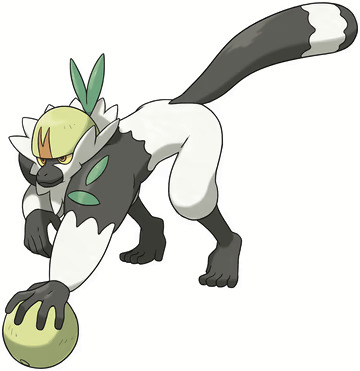
I believe Passimian is one such example - in fact, I would be surprised if the designer of Passimian is not the designer who has overseen most Pokemon since Gen 7 - and even then, Passimian is probably one of their BETTER designs (ech). There are three defining problems traits of this design that will become the standard for almost all Pokemon going forward.
It is wearing clothes. Namely, the melon hat, which covers the top half of it's head. The specifics of how this melon hat looks are also bad.
It has random markings on its arms. These "leaf shapes" serve no purpose other than to fill negative space to distract from the fact that this design is, in fact, boring. Due to their shape, these also look very unnatural, unlike something like the markings on Ivysaur, for example.
It is based on something from our modern society, a quarterback.
Whether these things are bad or good is... well, frankly, objective. They are bad, and if you don't think that, you're wrong, thank you. Starting with the next generation, all three starters also have all of these traits!

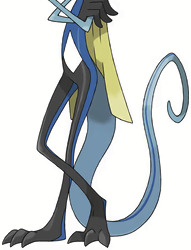

Yes, indeed! Clothes! Random markings! And, being based on something very modern, often sports. I could also posit a fourth design trait in object usage - Passimian has his melons, Rillaboom his drumsticks, and Cinderace his soccer ball. Suddenly, Pokemon need objects to be interesting (cough to distract from the fact that they are bland designs cough).
But Passimian is not the only Pokemon that functions as a precursor to design direction. The next big contender is

Araquanid. Now, I want to be clear, I actually really like Araquanid! I think this thing is cool as hell - however, Araquanid consists almost entirely of simple shapes. Circles, triangles, and tubes, as I like to refer to these kinds of designs. Going forward, many Pokemon designs will rely almost entirely on this simple geometry, rather than actual anatomy - and my theory is that that's because they've started designing Pokemon from the ground up in modeling software, specifically so that they will be easy to make, animate, and merchandise.
The thing is, I feel that Araquanid, as a single Pokemon using these design principles among MANY Pokemon that do not, is a very strong design! With many of these design traits that I've pointed out, it is not that you can't make a good design with those traits, but that when almost every single design does it, it is bland and stale and frankly creatively bankrupt.
Of course, even with all of these design traits in mind, just how bad most Gen 8 and 9 Pokemon are is STILL surprising. There are surely other factors at play. But I highly recommend going through this visual list of Pokemon and paying special attention as you go from Gen 7 to Gen 8 - you may notice the quality downgrade, as well.
Well, this post started out as me saying, I'm going to be replaying Sun and Moon now. Hopefully I'll enjoy it as much as I did the first time, and I can look back on the games as the true last good Pokemon games, rather than BW. Gonna use Oricorio-Sensu because I just realized how much I love that thing. Wish me luck.
3 notes
·
View notes
Text
About Copper
Let me tell you about someone named Copper.

Copper is a Teijru, one of the two species that inhabits the distant planet Kheji. Quiet and reserved, he doesn't socialize much, and typically prefers to keep to himself, remaining in his humble home in Crimson City, Kheji's biggest place of residence. When he's confronted by people, he tries his best to practice good manners and prefers not to start disagreements, resulting in a nervous and submissive demeanor.
He often passes the time drawing, though he doesn't find his artwork particularly special. Some of his art revolves around characters he made up for a sci-fi story he calls "Mercenaries," featuring a ragtag group of fictional aliens going on adventures to hunt different bounties and escape potential capture and/or harm. He fantasizes about the characters fairly often, pacing around in his home while semiconsciously playing story scenes out in his head, sometimes verbally. (It's an odd routine, and one he's been caught doing a few times in public, usually followed by ridicule.)
But some of his other art revolves around iconography. He seems affixed to working with simple shapes and building some interesting imagery around them. This type of art is what he is known most for, though when he's asked for his talents it's hardly ever in person, and a special box is placed a small distance away from his home for inquiries. He even uses a pseudonym to represent his work: "Geode."

His most notable designs include the Symbol of Orichalcum, the mysterious "soul of the planet" (top left); the emblem for the Crimson Khejian Army commissioned by their leader Pyrite (bottom left); and the "Puzzle Master" emblem commissioned by Beryl, the self-proclaimed Puzzle Master of Kheji (top left). While he's also credited for making the symbol for Sforzando (bottom right), he doesn't like taking all the credit, as it's literally "SFZ" written in the handwriting of its creator, Graphite.
While Copper has found success with these designs, he still feels like an inferior artist. He lives in the same city as Quetzalcoatlite (or just "Quetz"), who is well-renowned for his amazing paintings; Copper could never manage to reach the level of artistry and refuses to call himself decent at artwork.
This way of thinking, however, is only one of many things Copper is willing to point out as ultimate flaws of his, in addition to the "inferior artist" angle. Unlike most Khejians, he is unable to sense the thoughts and emotions of others through their life energy, or "fervor." On the flip side, others can't seem to do the same for him specifically, meaning he's incapable of reading how others think or feel before speaking or acting...and it's led to a number of bad judgement calls and troublesome and/or embarrassing misunderstandings. It also means he can't tell if someone is lying to him -- a detail that some have managed to abuse with him in the past. Because of this, Copper has become untrusting and paranoid of others. Even in regards to his outward appearance, he is quick to point out the black mark on his forehead. While most Khejians use coloring on their fur to stand out from each other, the mark on Copper's head is the result of a rare recessive gene tied to instances of black fur.

Unsurprisingly, Copper suffers from major depression, possibly due to his other deficiencies. He also suffers from severe anxiety, especially in regards to social situations, and it's hard for him to calm down when he becomes stressed. His poor mental health has been a constant problem that he's struggled to overcome -- it was so bad in fact that he had once attempted suicide (a story I won't tell right now).
Yet despite his "flaws and inadequacies," Copper has somehow managed to make friends over the years. Whether it's the artwork that he's made, the stories he's come up with, or just being a kind and accepting individual, he has a small following that he still can't believe is willing to tolerate him. These include the Linkha named Tea; a few fellow Teijru like Lead, Dravite, and Beryl; and even some robotic Teijru (or "Teijroids") like Topaz and Mica. They all seem willing to offer him support when he needs it.

...and sometimes when he thinks he doesn't.
----
In the grand scheme of things, Copper is a somewhat minor character in the universe he hails from. But he's pretty special to me, mainly because of all the characters I have, he reflects myself the most. It's not one-to-one, of course (no, I haven't attempted suicide, though the thought has come up every now and then), but I feel like most of the traits fit me. I find it hard to read people and understand their intentions, I get very stressed in social situations, I don't really find my art very remarkable, and I also have the habit of pacing around in private developing fantasy stories (like this one Copper's in.) So I suppose if I ever did decide I wanted a "fursona," Copper would be it.
But Copper's got some traits that make him stand out, and he finds those out later on. Maybe someday I'll detail that little adventure, and show what else makes Copper "special."
And no, I'm not trying to say that in a negative way.
6 notes
·
View notes
Text
Beta Cannon: the Pre Voyager Era of Kathryn Janeway | Mosaic v The Autobiography of Kathryn Janeway
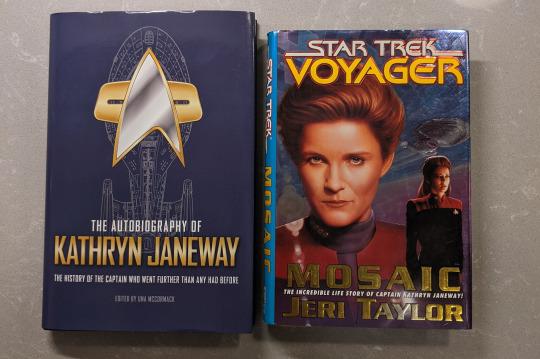
This weekend, I got a copy of the Autobiography of Kathryn Janeway from a local book store. For how frequently we speak about Mosaic in the community (despite having some flaws) I was shocked that I had not heard a lot about this book and assumed it was a bad thing. And yeah in some regards it was (see @mia-cooper’s post on the subject). I have a lot of feelings (I’ll post a proper review at a later point) but one thing that did stick out to me is the divergence from what we have considered Beta Canon, aka, the extended universe of Star Treks told through novels, short stories, video games, etc. After completing the novel, I jumped right into my old standby copy of Mosaic, which has dictated a lot of Janeway’s back story since 96. Both of these novels cover the beginnings of Janeway’s life and how she was shaped into the woman we know.
TLDR The Autobiography of Kathryn Janeway changes a lot of things for no reason. Some of these are for the good. Some for the bad. And some, for like no good reason at all, like it was fine as it was, and was accepted cannon for like 25 years, but sure fine whatever.
I will mention that, as Mosaic has been a book in my library and I have read it too many times, so of course, I do have a bias toward it. Additionally, I feel like it is fair to mention here that authors of Fanfiction have leaned on this as their bibles since 1996 as Mosaic is written by Jeri Taylor, one of the show-runners for Voyager. Because of its connection with a showrunner, Mosaic is also integrated into the canon of the show. It seems that most points that are taken from Mosaic in the Autobiography are only included because of their existence in cannon material.
Anyway, this review is going to focus on the characters that shape Kathryn and I will end with my final thoughts. This is long so to respect your dash, you are going to have to click keep reading. You’re welcome.
Obligatory Spoiler Warning for ALL of Mosaic, chapter 13 of Pathways, and chapters 1-7 of The Autobiography of Kathryn Janeway
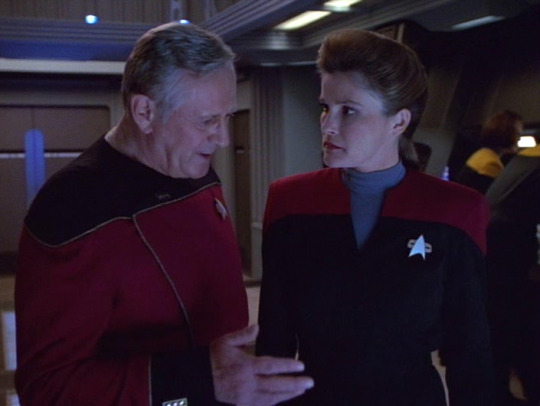
Edward Janeway
In all media, I feel like we can safely say that Kathryn Janeway is in fact a daddy’s girl. Her relationship with her father is very important to her, so it is interesting to see how it is portrayed very differently in both novels. In Mosaic, a lot of the highlights of Janeway’s earlier years revolve around time spent with him. From giving her special attention after ‘Your Sister’ was born, to consoling her after her losing tennis match and subsequent walk home in the rain, and trips to Mars, Kathryn mentions great fondness of quality time spent. In the Autobiography of Kathryn Janeway he is more described as an absent father, one that she always wanted to see and please. When he was home, she wanted all of his attention and to impress him greatly. She wished to follow in his footsteps after gaining a love of flight and the stars with a plane ride and a telescope he gave her. He tried to prepare her by detaining the events of the current conflict with Cardassia and inviting Starfleet brass over for dinner. Overall, in her early childhood, it makes more sense for Edward to not be around often. There is not a lot of conflict between the sources, other than the details of the aforementioned tennis match and different childhood nicknames.
Edward is in a crash aboard an experimental ship on Tau Ceti Prime which leads to his death. This is where the big differences begin. In Mosaic, Kathryn and her fiancé are also on board. In Autobiography of Kathryn Janeway, Kathryn is still on the Al-Batani. The fall out of this event has a great effect on Kathryn of course in both novels. As this is a missive shaping event of Kathryn’s life, I felt it very jarring to be changed. This moment shaped Janeway and gives us good context for why she handles situations the way she does. I see this trauma and I understand her character better, for dealing with the loss of two of the most important people in her life all at once.
Gretchen Janeway
The Autobiography of Kathryn Janeway was good to Gretchen Janeway as her character is basically a blank slate. We know little about her from Mosaic as it mostly focuses on Kathryn’s relationship with her father (and other male influences in her life). It is nice to learn more things about Grechen as with Edward’s job, it is likely that Kathryn was mainly raised by her. Other than being an artist, she also wrote some of the Flotter holos and wrote a number of children’s stories about the people of Bajor during the occupation. She does a lot of humanitarian work with the refugees from Bajor during the occupation. She loves to garden and get her daughters involved. She has a close bond with Phoebe due to their overlapping interests, but you can tell that she strives to support her in what she does. Overall, I like getting know Gretchen to be someone of than Kathryn’s mother.
Phoebe Janeway
I was shocked when researching Memory Alpha for this review, Phoebe is never named in any Cannon media up to this point (Star Trek Prodigy could very well change this). We know Janeway has a sister and she is an artist, but that is it. Both novels keep her very similar personality-wise. In both stories, Kathryn is not looking forward to being a big sister. They also both mourn the loss of their father together. In Mosaic, she is not mentioned much. Kathryn tells her she is not old enough on an off planet trip and Phoebe plays pranks on her. The Autobiography of Kathryn Janeway goes much more into depth. They don’t get along when they are younger. They fight a lot. I feel this is a very realistic portrayal of real siblings, vying for attention and approval, snapping when they don’t get their way. They both excel at what they do, Kathryn in her studies and Phoebe through her art. They seem to need to one-up each other at every turn. As they grow up, they grow closer together, as many siblings do. Points added for giving Phoebe a wife, something which has been included in a lot of fanfiction. Overall, there are no big conflicting points.
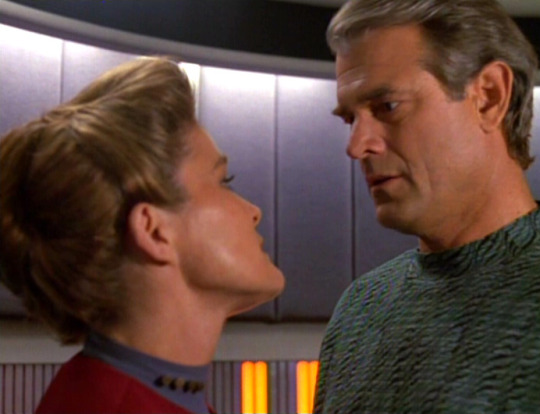
Mark Johnson
Kathryn’s fiance at the time of the Voyager’s disappearance, Mark is a very different part of Kathryn’s life in both novels. In Mosaic, he is a childhood friend and went by his middle name Hobbs. Seemingly always two steps behind Kathryn, he did a lot of the same activities that she did, tennis and swimming in the underground cave systems. He did these poorly, and this makes Kathryn always look down upon him. They reconnected after her father’s death and she fell head-over-heels for him. Personally, I always felt this was a little uncharacteristic of Kathryn, to run away from her responsibilities to be with a man. It just seems very out of character and has always bothered me. The Autobiography of Kathryn Janeway takes a completely different approach. She meets Mark as a friend of Pheobe and her wife as a widower. They hit it off and they fall hard. You can see the conflict in Kathryn as she debates how to move forward with a relationship as they have different outlooks on life. She has a drive to explore but does not want to be an absent parent. She debates quitting, which I don’t think is something Janeway would have ever done. Overall she decides to accept Mark’s proposal just before taking command of Voyager. This makes the Dear John situation a lot more believable as it makes sense that he would want to move on with his life much quicker. Overall, I have to just ask, why? I know Mark doesn’t have a lot of character, but why change basically their whole relationship dynamic?
Justin Tighe
Justin is a character I actually like for selfish reasons. This explains why I was very miffed that he was nowhere to be seen in the Autobiography of Kathryn Janeway. Justin is Kathryn’s first love, they were coworkers, engaged and in love, and dies in the same accident that takes her father. As a person who always wanted Chakotay and Janeway to get together, this incident perfectly gives the reason. She is afraid to get romantically involved with a crew member because of the nature of the job. This dynamic is seen between Picard and Nella Daren in TNG very well. Kathryn has learned the hard way that she can lose a person under her command and how it feels when you are in love with that person. In early Voyager, you can see she isolates herself from the crew and it takes time for her to get comfortable. And during Night she relapses to her old ways. This is the way I have always justified Janeway’s reluctance to have a romantic relationship during their time in the Delta Quadrant. By understanding her background, I have a lot of respect for that choice. Her relationship with Justin really shaped how she handles relationships and without the impact he had on her life, it actually makes her character weaker.
Owen Paris
Owen is Kathryn’s mentor. In Mosaic, they meet as he is reviewing her junior honors thesis advisor on massive compact halo objects. From here they gained a relationship built on respect and learning. It makes sense that, as he was her personal mentor, that she would be close with his family, and why she would seek out Tom as a person to bring with her to the Badlands mission. In the Autobiography of Kathryn Janeway, she does not meet him until she is on the Al-Batani. This doesn’t only weaken her relationship with Admiral Paris, but moreover weakens her relationship with Tom. If he was her superior officer, why would she develop such a ‘big sister’ mentality to Tom if she didn’t have as many opportunities to meet him?

Tuvok
Mosaic does not go too much in depth with Tuvok and Janeway’s relationship, but its sister novel Pathways does. In Pathways, Tuvok meets Janeway when he is an ensign under her command of the USS Bonestell. The Bonestell and the Billings, two ships that Janeway served on, tend to get confused a lot. Most sources have Janeway’s first command as the Voyager, Including Voyager itself - “It doesn't seem like my first command is shaping up the way I expected,” Janeway Shattered. The Autobiography of Kathryn Janeway has her and Tuvok meet on the Al-Batani. I actually really like the dynamic between them, as they grow to respect each other over a much longer period of time. I also like that, though Janeway climbs through the ranks, it does not change their relationship dynamic as she still relies on him and asks him advice as if they were equals. I think giving them a longer time to build their relationship. Also would like to note that Janeway and Tuvok also had a friendship with the original CMO of Voyager, Dr. Fitzgerald. I always wanted to know more about the Pre-Caretaker crew and I would have loved to see this dynamic and how the grief of losing a close personal friend in the Caretaker incident would impact them both.
Also I feel obligated to shout out the Janeway and Tuvok story in Star Trek Waypoint One-Shot. I need to get around to doing a series retrospective, but this short story I have not seen anyone talk about and I love it so much. Please read Waypoint. Okay next.
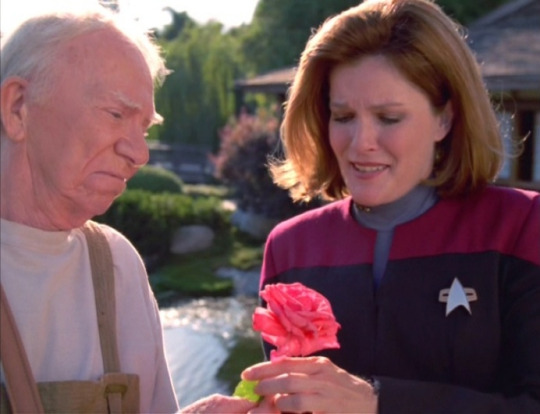
Other characters
Cheb - Janeway’s boyfriend in Mosaic. He was kind of an asshole and got her into trouble. He is not in the Autobiography of Kathryn Janeway and I see no problem with this.
Boothby - “[he is the] head groundskeeper at Starfleet Academy. When I was a cadet, he used to give me fresh roses for my quarters,” Janeway Revulsion. Boothby is not in Mosaic. In the Autobiography of Kathryn Janeway, it is explained that her mother loved to garden and this was something that Boothby did as a gradian figure to make her feel at home and destress. Makes sense.
Aisha - A childhood friend of Katheryn’s. Only in the Autobiography of Kathryn Janeway. Mosaic has this weird thing about highlighting the relationships with only the men in her life, so it is nice to see her have some other female friends.
Nexa - Katheryn’s roommate at the Academy. Only in the Autobiography of Kathryn Janeway. Nexa helps broaden Kathryn’s horizons by helping to learn about Exoliguisticts, first contact, and the Betazoid culture. Again nice to see her have other female friends.
Riker - Yes they go on a date in Mosaic. He is not mentioned in the Autobiography of Kathryn Janeway. I know he is a gag character but I still liked it.
-----------------------
Final Thoughts
A lot of characters were changed between these two novels. There is a lot to like and a lot to hate. I really like what the Autobiography of Kathryn Janeway did with characters like Tuvok and Gretchen Janeway. Other characters were not so lucky (Justin, sweetie I’m so sorry that they would erase you like that, oh my god). It’s a mixed bag, but one thing I need say is... why?
We have had a good thing going here with the established canon as is. Mosaic (and Pathways) is the foundation of which the last 25 years of fanworks and the relaunch novels are based on. Why change history when it is already written?
Always, would love to hear your thoughts and thank you for reading my novel of a post. I will see you in the full review.
#star trek#star trek voyager#kathryn janeway#janeway#voyager#voyager book club#star trek novel#the autobiography of kathryn janeway
57 notes
·
View notes
Text
Lifetime of Love
Pairing: Suga x Reader
Genre/Warnings: NSFW, Overstimulation, Mythology AU, Demi-God!Suga
Prompt: Mythology
Summary: As the son of Aphrodite, Suga knows more than most when it comes to beauty and love. But knowledge and experience are two very different things. OR Suga finds true love.
A/N: This is my contribution for the HQHQ NSFW collaboration. There are so many talented writers on the server and I highly encourage you to check out the collaboration masterlist here to see how everyone decided to run with this prompt. As always, thanks for beta-ing @sawamooora
Being the son of Aphrodite has its perks. Even as just a demi-god, Suga is borderline ethereal, naturally drawing men and women to him with his dazzling silver hair, enthralling hazel-brown eyes, and coquettish charm. It’s effortless, the way he wakes up looking just as radiant as ever, the way his hair is naturally shaped and styled even after tossing and turning in bed. Clothing is just a technicality, just fabric he wears to not risk indecent exposure. Why waste time and effort thinking of putting an outfit together when he could wear a burlap sack and still have admirers flock to him?
It’s not a bad life and he knows others stare at him with envy, wondering what it’s like to be so beautiful, so loved, so wanted, so desired. Never an off day. Never a hair out of place. And truth be told, maybe more of his mother runs in him than he likes to admit, if the swell of pride and satisfaction he gets from having everything in life handed to him on a silver platter is anything to go by.
Life is easier for beautiful people. It’s a hard pill to swallow for the masses, but a reality that Suga has no qualms taking advantage of. After all, he might as well get some benefit from being a goddess's son, even if his mother and him don’t always see eye to eye.
Suga can appreciate beauty and love. Aphrodite has taught him to have an eye for the finer things in life. He’s not stubborn enough to deny that he enjoys waking up entangled in silk and satin sheets, surrounded by a beautifully decorated apartment, to reject the ecstasy he feels when he has one or more playmates in his bed.
But love of the flesh is different than love of the heart, and he wonders, despite how blasphemous it is to question a deity, if his mother truly understands what love is.
Aphrodite’s love is a seemingly fleeting and fickle thing, a fire that blazes bright and strong, only to burn out just as quickly as it had risen. And he judgmentally watches as she bounces from man to God to man to God again and again, grimacing whenever he meets his “family”, knowing how she’s slept with most of the other gods in Olympus.
He has no doubt that in her own way, she truly has loved each entity she’s slept with. But he wants something different, something less promiscuous, something less shallow. He wants true love, a love rooted in something much deeper than superficial appearances, a love rooted in a connection of souls, a love rooted in the bond of two people truly seeing and knowing each other’s flaws and strengths, yet still determinedly pursuing each other.
So he steadfastly continues on, searching for the one.
There’s no end to the line of people who practically throw themselves at his feet, desperate for a chance to catch his attention. He goes on endless dates, entering and leaving countless relationships. Some attempts are longer than others. Some partners have hope churning inside of him, have hazel-brown eyes sparkling in interest. But in the end, they’re all the same and the flutters of his heart become anchors of disgust inside of him when he sees their leering eyes, the lust driving their actions, the way they never see past his handsome face and attractive body.
No one sees Sugawara Koushi. They only see the body of a man literally blessed by the gods.
Maybe it was naive of him to believe that he knew more about love than the goddess of love herself. Maybe sleeping around with other attractive bodies is all his life will amount to, can amount to. And as he watches the people around him break-up, divorce, chase after some happy ending that seems more and more unattainable, he gives up his rose-colored dream of a fairytale romance.
But life has a funny way of dropping something in your lap just when you’ve given up all hope.
Aphrodite had not been amused when Suga had told her he was going to be a teacher at a local elementary school in the countryside. Children and parental instincts have never been her forte, and he remembers the long winding back and forths they had as she implored for him to rethink his decisions, flaunting modeling and acting opportunities in his face, anything to have his handsome face plastered on televisions and magazines.
But he had remained steadfast in his decision and she had finally relented, shaking her head and letting him know that she’d be ready to help him when he’s done wasting his gifts and time.
“You’re only part-god, Koushi. Your beauty will only last so long.”
He knows there’s no malice behind the words. It’s just a cold hard fact, a reminder. And he simply nods in response, secretly wondering if that would be so bad, letting age take its toll and put him on the same playing field as the rest of the world.
But he has years before he crosses that bridge and he dedicates himself to finding fulfillment in life by caring for and teaching the children in his class. A megawatt smile spreads across his face as he watch them play and excitedly call his name, politely ignoring his fellow teachers who parade themselves in front of him for an ounce of his attention, never entertaining the married mothers of his students who try to lavish him with unnecessarily exuberant gifts and woo him with fluttering lashes.
It’s a tiring never-ending dance, so when he hears about the arrival of a new female colleague, he internally sighs, no doubt in his mind that you’ll be just like the rest. So imagine his surprise when you just casually smile at him when you’re introduced, no interest in your eyes, no lingering gaze, before turning your attention away from him without a second glance back.
He wonders if it’s a fluke, hopes and prays that it isn’t. It’s almost comical, complete insanity, how his heart races, his eyes blow wide, just from your sheer nonchalance. And for the first time, it’s Suga who’s left wistfully staring as his eyes trail after your figure even long after you’ve turned the corner of the hallway.
He’s seen his mother’s work, seen the way humans pursue their love interests with almost fanatical effort. But he had never understood, not until now.
It’s an intoxicating feeling, addictive, the thrill of the chase energizing him in a way he’s never felt before. It’s hard, meticulous work finding reasons to visit your classroom, finding ways to weave himself in conversations you’re a part of. But it’s always worth it when he sees the genuine fondness in your eyes, the way you look and really see him, the way you care about the man underneath the shiny facade, in a way no one ever has before.
And when the two of you go out for a friendly lunch one day, when you order his favorite dish that he’s only briefly mentioned to you once in passing, without even missing a beat, his heart stops. It’s something no other partner has bothered even taking note of, too busy trying to impress him with high-end meals and fine dining. And just like that, he blurts out his confession, heart hammering, fingers nervously twitching as he awaits your response.
For many years to come, the two of you will debate whether or not that lunch counts as your official first date as a couple.
Dating you is everything he’s dreamed of and more. And for once, Suga feels like just another regular man, a normal human being as he holds your hand in his, giggling and sharing stories, feeding each other bites of food, lazing around on his sofa watching TV.
But as a romance movie runs in the background and the main couple kisses after the male lead raves about how stunning his lover is, he turns his attention to you, curiosity nagging at him, a tiny tendril of lingering fear squirming inside of him.
“What do you like about me?”
There’s silence as you owlishly blink and look up at him, surprise and confusion flitting across your face as you try and process where this question is coming from. But when you see the worry, doubt, and insecurity muddling your boyfriend’s eyes, you interlace your fingers with his and cuddle into his side, resting your head on his shoulder as you continue gazing at him.
“I like the way you always insist on getting the highest spice level at every Chinese restaurant we go to that serves mapo tofu, even though you complain about your mouth burning all night long afterwards.”
Suga chuckles, unable to deny the truth of those words.
“I like the way you act like a clueless angel even when you’re wreaking havoc and chaos, you big trouble maker.”
This time Suga does try to plead innocence, although all he can do is sheepishly grin when you start listing off event after event of mischief he had instigated and encouraged, much to Daichi’s and Asahi’s dismay.
“I like how patient and gentle you are with your students and your old underclassmen. I like the way you nurture them, mentor them, encourage them to keep on going, keep on trying even when the going gets tough. And I like how you instill that belief in your own life. If we have children of our own one day, I know you’ll be the father I’ve always wanted for my future kids.”
The weight of your last sentence hangs heavy in the air, the meaning, the hope of a lifetime promise has Suga’s jaw dropping. But when you shyly look away, nervously biting your lip as he just dumbly stares at you, he jolts back to reality and you yelp as lips suddenly crash against yours.
Sex with Suga is always sweet, with a hint of spice when your lover is feeling particularly mischievous. But it’s never been like this, full of desperation, untamed desire, a want so deep that it leaves both your minds in a hazy disarray. You gasp as you’re firmly pushed down, until your back hits the couch and you’re moaning into the mouth pressed against yours, your tongues tangling with each other in an attempt to taste every crevice.
The wet sounds of your lips connecting and disconnecting over and over again, the frantic sounds of fabric being rustled and tossed off, they all mix in a passionate symphony punctuated by breathy declarations of love, by whimpered names.
You throw your head back as a hot wet mouth sensually carves a path down the column of your neck, to the delicate swoop of your collarbone, sighing in bliss as they end in the valley of your breasts, two hands gently tweaking and rolling your nipples. And then fingers are replaced with a tongue, with lips, and your back arches, body writhing, seeking more, more, more as you wildly grind against your lover’s body.
Usually Suga likes to take his time with you, unwrap you piece by piece, unravel the strings that tie you together, coax the prettiest sounds out of you. But today something more carnal, more desperate, more raw spurs him on, and he feels more beast than man as he devours you, plunders you, marks you as his for all eternity.
“Koushi!”
You wail as he wastes no time in quickly snapping his hips, filling your slick walls with his cock. There’s an urgency behind his pace you’ve never felt before and you dig your nails into his shoulders, eyes rolling back in your head, lewd moans echoing in the room as you wrap one leg around his back, the other dangling off the couch.
You’re not sure exactly what the trigger had been for this, but you’re not complaining, pussy walls only clamping down even more when you see the feral hunger in his eyes, the drag of his cock against your insides even more pronounced.
He can feel your end approaching, sees it in the way your head tosses side to side, the way your eyes glaze over, and he brings a hand between your bodies, toying with your clit, circling it, rubbing it, never losing his rhythm as you begin to convulse, body thrashing, nails scratching his skin, a debauched version of his given name rolling of your tongue. Only when you begin to whimper, shaking hands trying to grasp his fingers still playing with your oversensitive nub does he relent, smiling down at you as you entwine your fingers with his as he continues to thrust in and out of you.
Suga’s been told he looks like an angel time and time again, but as he stares down at your completely ravaged and exhausted form, the way your chest heaves up and down, the sheen of sweat on your skin, the after tremors of your body, the duality of how you cling onto his hand despite your wanton state, he thinks you’re the true angel here. Maybe a fallen angel, but an angel nonetheless and he can feel his balls tighten, the last shreds of his endurance ripping apart at the seams as he takes in your breathtaking appearance.
But he needs more than that, needs you, needs you here and with him, and he meets your lips in a bruising kiss, a silent demand for your attention, adjusting his hands until your fingers are interlocked on either side of your head.
“Look at me.”
He patiently waits, peppering your face with butterfly kisses, slowing down the rocking of his hips. You’re so tired, heavy eyelids wanting nothing more than to close, but you’re still in a rocky ocean of pleasure, body still registering and reacting to every touch, every move. And when his soft voice makes its way through the fog, you know you need to listen, you want to listen. So you turn your eyes until they lock with hazel-brown, a weak smile plastered across your face when you see the love and affection pouring down onto you.
“I love you.”
Both of you grin as the three words unanimously exit your mouths, but the smile is wiped off your face as he resumes his pace, tempo beginning to stutter, his own head being thrown back in ecstasy as he approaches his end. Your overstimulated body is barely hanging on by a thread, pathetic mewls dripping from your lips, and you keen when sticky spurts fill you, Suga’s cock buried balls deep inside of you as he breeds you, coating your quivering walls with his essence.
Suga gently lowers his body on yours, capturing your mouth in another kiss, one much gentler as both of you catch your breaths, bodies feeling soft and pliant as post-coital bliss wraps around you like a fluffy blanket.
Beauty is a fleeting thing. His mother’s not wrong about that.
But love? Love isn’t nearly as fickle as beauty, he thinks, as he holds you in his arms. And he smiles, letting himself be lulled to sleep by your rhythmic breathing, dreaming of the long and full life still ahead for both of you.
#haikyuu smut#suga x reader#sugawara x reader#suga smut#sugawara smut#haikyuu imagines#haikyuu fic#haikyuu scenarios#haikyuu x reader
199 notes
·
View notes
Text
Day 9: 👑 Final Curtain Call 👑
A letter arrives in the mail. It is, in one word, beautiful—the header and footer are adorned in a blue-violet banner, edged with a deep red. Gold foliage decorates the corners of the page, granting the letter a sense of style. The handwriting, too, is flowing and graceful.
A large toiletry bag also appears in your mailbox. When you unzip it, you find a wide assorment of jars, tubes, and bottles inside—Each frosted container fades from lavender to clear glass, and rach is packed to the brim with cosmetically elegant fluids or creams. Schoenheit Skincare, the labels proclaim in gold, accompanied by a crown-shaped logo. A large pump of moisturizer has a booklet of instructions and skincare tips secured to it.
***Chapter 5 spoilers!***
To the Ramshackle Resident,
I must extend my gratitude to you for hosting me at your dorm. It was certainly not to the same standards as my usual accomodations, but it served its purpose as our training grounds for VDC.
There is still much to be desired in regards to your managerial abilities. Furthermore, the other potatoes’ vocal and dance skills are still not quite up to par. And their charisma and stage presence? Don’t make me laugh. Of course, none can compare to I, but... You potatoes worked with what you had, and you did well for first-timers. Give yourselves a pat on the back.
... Regarding the Overblot incident, that, too, is something I am thankful you were there for. I never expected for unpolished gems like yourselves to have that amount of fight in you. Then again, I never expected that that ugly aspect of me to be put so blatantly on display. The jeaousy, the rage... I thought I had learned to hide them so well—but it was in stowing those feelings away that they festered into something far more unsightly than what they originlly were. No amount of makeup or acting can cover that up.
Instead of me knocking some sense into you, you potatoes knocked some sense into me. The roles of teacher and student were reversed. Even Epel pitched in to that battle. I suppose he has finally managed to defeat me, just has he has desired since his first day. In that sense, perhaps you all have grown much more than I had initially anticipated you would. For that alone, you deserve a standing ovation—you are the heroes of this story.
I have already informed the headmaster of my Overblot, just as I have said I would. I intend to take full responsibility for my actions. I currently await his judgement. Whatever punitive measures he deems necessary, I shall accept with my head held high. That is the pride of a professional such as myself. Until the final curtain call, I shall stand proudly upon this stage. Ironically, that has ultimately been my wish. It may not have come true as I had envisioned that it would, but... no fairy tale becomes reality without a price.
Know this: nothing in the world is simply handed to you. All my life, I’ve had to work hard to claw my way to the top. I didn’t want to rely on my father’s repuation to make a name for myself in the industry. I simply wanted to be seen as “Vil”. Not “Vil, Son of Schoenheit”. To that end, I have never stopped pushing myself to even greater heights. After all, magic that lasts only until midnight is useless.
In the real world, things are not so clear as black and white. There are no true “heroes”, nor “villains”. People are people, their moralities and views colored grey. I see that now—through all the distorted images in the mirror, through all the noise of the cheering crowd of onlookers.
I am beautiful, and I am ugly. Both good and bad. The hero and the villain of my own story. I don’t need anyone else imposing their will upon that.
I won’t lie. With all my heart, I still desire Neige’s defeat at my hands. I want to beat his simpering smile to the curb. It makes my blood boil knowing that our efforts were in vain, that we lost to a nursery rhyme, of all things! ... And that Rook!! I cannot believe he would betray me like that...! I should tear his heart out for that transgression.
... But in the end, I am grateful for those shocks. I think I needed them more than anything. That brutal honesty, a slap in the face to wake me up from my own clouded viewpoint. Perhaps I was the one believing in a fantasy all along, despite thinking otherwise. I was so concerned about how others envisioned me that I eventually lost sight of myself. The “me” in the mirror, in the reflection of my phone... Was that really “me”?
I am no longer that “me”. I’ve emerged from the ashes of the fire, stronger and burning more beautifully than ever.
Do not be mistaken. This is not my defeat. This is only the beginning.
I still want a “happy ending”. To be on that coveted stage until the final act. When the curtain calls, I want that spotlight to shine the brightest upon me, for the audience to cheer the loudest for me. For now, I want to work on myself—for I am still imperfect. A gem with many flaws.
l’ll settle the score, and this story of mine, on my own terms. Watch me from the wings, potato—and prepare to be utterly starstruck.
Do not think that just because VDC is over that you can go back to slacking around the clock. I want you to work hard toward your goals as well. I’m expecting great things of you. Who knows? Perhaps when next we meet, you will speak of journeying to the Underworld and back. Now that would be a story for the ages.
All the best,
👑 Vil Schoenheit 👑
Pomefiore Dorm Leader
Magicam Influencer, Actor, Model
Movie Appreciation Club Member
Third Year NRC Student
#Vil Schoenhet#twst anni#twisted wondrland#twst#twisted wonderland anni#disney twisted wonderland#twst anniversary#twisted wonderland anniversary#spoilers#magic mystery letters
175 notes
·
View notes
Note
I'm okay with a bunch of disorganized rambling honestly 😂. But if I had to narrow it down then I guess I want to know about main and side characters and how they compare to the original?
I know that tumblr is the Prime Site for disorganized rambling, but I have perfectionism issues. But that is a great question, nonnie, and I will be happy to ramble is a slightly less disorganized fashion.
When reading Maximum Ride as a somewhat-formed adult who discovered they enjoy English classes about 3.5 years ago, I noticed that JP, when writing, doesn't understand consistency. At all. Which means, in many ways, I have a free sandbox to work with.
Spoilers for my rewrite WIP, because I strongly believe that if a story would no longer be good if one had spoilers, then it wasn’t a good story in the first place.
I'm trying to keep the backstories the same, plus or minus the scientific method and a few characters (RIP my OCs. I want to bring you back so bad but it wouldn't fit with the thematic narrative). I've mostly kept their (starting) abilities the same, too. Without further ado, I'm going to introduce some WorldBuilding. (If I'm good at nothing else, I'm good at world building)
First off. Logically.
How are they getting Cable?
How are they getting internet?
How are they getting money to eat and stuff?
JP's answer: handwave it off. Sometimes you need to ignore logistics for the sake of plot. This is an answer I'd accept from an author that I like, such as Julie Kagawa, that makes amazing worlds, characters, and narratives that I will happily handwave a few things that wouldn't work in the real world. James Patterson, on the other hand, did not make any of that; he made a cool concept, some good rough-draft characters, and nothing else, and therefore this is an unforgivable sin.
Wasp's answer: They are not getting any of that.
Introducing Cottagecore.
The house is off the grid. Solar Panels and a wind turbine create electricity. They have their own well. They grow their own food, raise livestock for eggs, milk, and wool, and trap fish for meat. They get money through dumpster diving and pawning. They still have to steal half of the necessities they can’t make themselves. They do have a TV, but it can access about three channels on a clear day. Internet is only a thing when they go to the public library.
Giving the flock a background that’s heavy in farming and livestock rearing shores up the plot holes mentioned above, but in my opinion, ties the flock more tightly to the environment, thus giving them something tangible to lose when they have to leave the E-shaped house. Because they’re not just leaving a house and a safety net— they’re leaving their entire way of life with no promise of getting it back. It also gives them a tangible connection to the earth in case I want to actually pursue the global warming themes.
Main Characters
Maximum “Max” Ride (Birthname: nonexistent)
First off, I'm letting her be Latina, James Patterson.
In the original, Max was very much the headstrong, independent, action girl. Leaning into Strong Female Character (TM), but overall she had a strong, solid foundation and enough character consistency through the first three books for me to not have to just make an entire new character. However, I felt that she was, in some ways, a bit too Action-Girl and Strong and Capable. Yes, Max is incredible and competent, but she’s also fourteen. She’s a child.
In the rewrite, Max’s character is still headstrong, independent, capable, and sometimes not the best at listening to others. All of that’s the same. But she’s that way not because of girlboss energy, but because there’s no one else to do it. She doesn’t want to lead, necessarily. She wants to get some rest and let someone else handle the problems life keeps throwing at her. But she knows if she did that, the responsibility of leader would fall to Fang and Iggy, and she can’t ask that of them. She doesn’t want to place that burden on anyone else (Look, there’s a reason I chose Ayano’s Theory of Happiness as one of her signifier songs, okay?). Her narrative is very much centered around burden, and also around loss. She lost her cultural heritage when she was taken away from her birth family, she lost her childhood to being a leader, she lost a good deal of her friends to the school (RIP my OCs), she lost Jeb, and then she lost her stability. And she’s going to lose a lot more before the end of the story. So a lot of her character arc deals with learning that there are some things she can’t fix, some things that can’t be recovered. She can’t get the E-shaped house back. She can’t get her Little Baby Angel back, even after they rescue her. She can’t get her friends back from the school. And instead of working so hard to recover those or find something to replace them, she has to learn to live with that sense of loss and move on with her life without feeling guilty for leaving things behind. And she has to learn that asking for help and sharing her burden is selfish or weak.
Other changes I made that don’t necessarily fit into her narrative arc, but you asked for rambling so rambling you shall get:
Max hallucinates, because mental illness is also a prominent theme in the rewrite. She doesn’t have a psychotic disorder, but her C-PTSD causes visual/audio hallucinations, especially when she’s stressed or sleep deprived.
Max ends up having a Gender Discovery throughout the story and goes by He/She pronouns eventually. I don’t know when, but it will happen.
As far as genetic modifications/special quirks go, she can fly faster than the rest of the flock, but not 300 miles per hour. She averages about sixty mph with diving speeds of 240. She cannot breathe underwater or shut down her organs on command. She also has the Super Special Power to predict the weather, but that’s not because of genetics, it’s because she has chronic pain in her right arm that gets worse when weather fronts change.
Her favored weapon is her trusty rebar that she picked up from a condemned building. I think she’s going to name it eventually but I don’t know what yet.
Fang (Birth name: Gabriel Xue)
In canon, Fang is characterized in early books by being the “dark, strong, silent type”. He’s probably the most reserved member of the flock, to the point of falling into the Brooding Mystery Man trope in parts of the book. They care a lot, but they’re not the best at conveying that, especially with the younger members of the flock, and at times their high empathy leads them to making mistakes. Despite the high empathy, he’s often compared to a robot due to his lack of expression and external emotions.
Well, first change is that they’re not a man, so jot that down—
If Max’s narrative is centered around burden and loss, I would probably say that Fang’s is centered around humanity and moving on. None of the flock was treated as human while in the school, but Fang was more often than not treated like a wild animal due to “behavioral issues”, and therefore had and continues to have a difficult time considering themselves real and alive, let alone human. This manifests through a several different ways— where in canon Fang definitely had a ‘fight’ reaction, in the re-write they have a ‘freeze’ or ‘shut down’ instinct. They’re selectively mute for multiple reasons (including derealization, jaw pain, the fact that they didn’t learn how to speak until they were 10, and genuinely forgetting it’s something they’re capable of), a period of Cotard’s syndrome, and a tendancy towards self-loathing and self-sacrifice. In short, Fang is still halfway stuck in the mindset that most of the flock grew out of when they escaped in the school, and doesn’t know how to move past it.
Much of their character arc revolves around not necessarily seeing themselves as human, but learning to treat themselves as human even when they don’t feel like one (or even feel real), and knowing that just because they don’t feel human all the time doesn’t mean anyone else can treat them the same. They never start easily expressing their emotions, and they’re always going to be selectively mute, but they learn to accept that those aspects of themself aren’t character flaws or signs that they’re sub-human.
Other additions to Fang’s character include:
They don’t get their hair cut in New York. It stays long through the entire series. They have the longest hair in the flock by the end of the series, and they can wear it in so many styles.
Fang uses they/it pronouns because themes of reclaiming the weapons used against it and, more importantly, Gender.
They’re actually really good at spelling compared to the rest of the flock, because they and Iggy communicate with Print-On-Palm when they’re nonverbal, and they’re nonverbal for some pretty long stretches of time.
They and Max have... zero romantic tension. At all. There is none. The number of times Max calls them her sibling/little sibling in the first arc alone is staggering, and that will not change.
Igneous “Iggy” (Birthname: Jamsetta “Jamie” Griffiths)
I’ve talked about Iggy before. Canon doesn’t give us much to go off of, but from what’s shown, he’s smart, sarcastic, has sharper edges than Fang and Max, and also has a sizable ruthless streak. So that’s what I have to go off of.
The big difference between Iggy and Fang&Max is that Iggy has a much better memory of the School. Most of the flock have areas (months or years) that they don’t remember, or people that they’ve blocked from their mind, but Iggy... doesn’t. So he’s the one that remembers all of the other AVIAN test subjects that were old enough to have names and identities but died due to complications. Max might have the burden of leadership, but he has the burden of memory. And that has lead to both a massive fucking guilt complex, because why did he survive when they didn’t, and, as mentioned above, a ruthless streak that he doesn’t shy away from.
Which is to say, by the end of the story, Iggy has the highest kill count.
I love, love writing Iggy next to Max and Fang. I love writing Iggy next to Gazzy and Nudge. Because, I say this with all of the love of the world, but Iggy is not a good person. He is loyalty and love incarnate, and the world can burn down if he and his siblings are safe. Max and Fang will always try to save as many people as they can. They will wonder what’s wrong with them the first time they kill and don’t have a mental breakdown about it. They are good in a way that Iggy is not. He’s okay with killing Erasers. He’s okay with killing humans. He’s okay with killing people who might not necessarily deserve it, if they show themselves as a threat or are simply in the blast radius. He knows perfectly well that most of those Erasers he’s murdering are four and five and he is okay with that, because a lot of the AVIANs were that age when they died. (Yeah, in the rewrite it’s not Fang who has an issue with Ari; it’s Iggy who wants the 7-year-old wolf-boy dead.)
And this is, of course, juxtaposed with Iggy being really, really good with Nudge and Gazzy (especially in the beginning). Because, again, he actually remembers being a child. He remembers a lot of kids that died and is therefore fiercely protective of the kids that didn’t, as well as fiercely protective of the innocence that he never got. So he’s the one that cooks their favorite foods when they’re having a bad day, always makes time when they want to talk about something, and convinces Max to let them go to that toy store in New York because, yeah, he Max and Fang aren’t kids. They never were. But Nudge, Gazzy, and Angel can be. (And if he has to be a murderer to preserve that, then he’s perfectly okay with that.)
He and Angel don’t get along very well, though. The telepath doesn’t like hanging out with the person with the most clear memories of the school.
Other additions:
Iggy is trans and says trans rights
He also has paranoid episodes, because C-PTSD. Sometimes they’re very helpful. Sometimes they are not.
I actually decided that he’s one of the flock that doesn’t meet their parents. I know in canon he did, but I always found that very clunky because it didn’t add to his character. He was one of the characters who, until it was convenient for the plot, seemed to care the least about his family. I’d much rather give that to a character whose arc would benefit from it.
Iggy! Gets! Older Sibling Rights! Seriously, he’s two months younger than Fang, he is just as capable.
Iggy does not know braille because Jeb decided it wasn’t necessary for him to know. Iggy is also the best speller in the flock, because Print-on-Palm was the only way to talk to Fang for a solid year. Yes he mocks everyone over this.
Iggy is the only member of the flock that enjoys swimming and can take into the air from water. Everyone else in the flock is incredibly jealous.
Nudge (Birthname: Monique Robinson)
If Iggy is defined by his memories, Nudge is his polar opposite. She was seven when she left the School, but she has next to no memories of it. She is missing a lot of time in the first year she escaped. And that causes... a lot of things. It makes her feel disconnected from her older siblings, it gives her the ability to function in society in a way the other’s can’t, it lets her feel less grief over the ones that didn’t make it and she doesn’t remember, it makes her feel guilty that she doesn’t remember what she’s old enough to know.
Basically, in order for me to keep the character of Nudge as I saw her (more extroverted, not afraid of the world, fascinated with humans like her siblings aren’t, desiring to fit in instead of isolate), I had to put a little bit of distance between her and the flock. Of course, she loves them— that will in no way change— but she’s old enough that she should remember the school (and her dead friends) unlike Gazzy and Angel, but she can’t, and she very much fears forgetting the flock if anything happens to them. So she’s trying desperately to keep the flock close and wants desperately to experience the world at the same time, and doesn’t know what to do when she can’t have both. That’s her biggest character conflict throughout the series, along with that in-between area where she’s not quite where her older siblings are but understands so much more than Gazzy and Angel, and where she stands in that.
So yeah. Nudge’s journey is that in looking for belonging in the world, in her family, and in herself.
This is why she’s one of the ones that gets to find her parent, James Patterson.
Other additions include:
She never straightens her hair. Never. Her resources at the E-shaped house aren’t perfect, but she still has learned how to take care of her hair and has a few styles she cycles through.
She becomes the default person Max sics on people when the flock is trying to befriend them. Also their de-facto diplomat around strangers.
As in canon, she does take some time away from the flock to expirience ‘normal life’. This does not last long due to the stress of being separated from her siblings/not being able to help them and [REDACTED]
Nudge is... not the only person in her head. I’m not focusing on it much because she doesn’t actually know and neither does the flock (I don’t know if they ever figure it out during the series, either), but she has dissociative identity disorder. She’s not aware of her alter(s?). Her alter isn’t super aware of her, either.
The alter that I’ve developed is named Oxy and is not super aware of the outside world. In her eyes, she’s still seven and they’re still at the School. She would not recognize the body as her own if she looked in a mirror.
Nudge actually leaves the flock for a while to pursue her dream of living a normal life. She deserves it. She learns how to make muffins and the basics of software development. These things are unrelated.
Gasman (Birthname: No first name, surname “Falk”)
Honestly, writing Gazzy is kind of hard for me. Partially because I’m not great at writing kids, and partially because I feel like he’s a pretty surface-level character in-series that... isn’t super compelling in canon. But even if that’s the case, I try to treat all of my characters with respect, so here we go. In my rewrite, he escaped when he was four, which was half a lifetime ago for him, so his memories are ill-defined. Therefore, he managed to circumvent a lot of the trauma that the rest of the kids have, and not in the way Nudge did, which is by creating an elaborate blockage in her memories.
Which means Gazzy... really doesn’t know how to deal with all of this traumatic stuff happening. So much of his development turns out to be a coming-of-age narrative. Learning how to deal with the horrors of what his siblings grew up with. Learning the fears that they had the entire time. Losing his innocence when everyone around him never had it in the first place, and being so terribly alone because of it. Because, really, how can you explain such a deep loss to people who never had what he had? How can they help in a way that matters?
Also, relationship-wise, I’m slowly deteriorating the relationship between him and Iggy. Slowly. Or, changing it, at least. Gazzy hero-worships Iggy in-series, and for good reason, because Iggy is super cool, especially in the eyes of an eight-year-old, and especially when Iggy has taken care to cultivate parts of his behaviors to be child-friendly. Part of growing up is seeing the flaws in your heroes, and Gazzy has to learn how to deal with it. End of the series Gazzy is much less closer to Iggy than beginning of the series Gazzy, and neither of them are really okay with that, but they learn to live with it, because that’s really all they can do.
Notes:
I’m keeping the mimickry! It plays a bit of a bigger role because that’s how Gazzy learned to talk. I’m debating whether or not he has his own voice or if he just borrows the flock’s as he sees fit. He also uses it to scream really loudly and occaisonally burst the eardrums of Erasers.
At one point he cosplays as Jessica Jones. No you don’t get any more context than this.
He has a horrible sense of fashion.
I’m changing his name eventually because it sucks. He’s either going to change it to Gannet, Garrison, or Ivy Mike temporarily, and permanently to Zephyr. (I never said I was going to make his name GOOD, because he’s eight, but it’s changing. You’re welcome.)
Angel (Birthname: No first name, surname “Falk”)
It’s just... a completely different character, at this point. I’ve changed so many things about her in an attempt to make her consistent and act like a six-year-old and work in the whole “telepath before she has a solid sense of identity”, so it’s a different character. Also, I’m tired of writing coherently or in paragraphs, so have some interesting facts.
She has epilepsy! Super severe epilepsy! I think she might also develop juvenile MS in the future because her brain has so many scars from being a fucking six-year-old telepath. There’s no way she could get out of that unscathed.
She has more memories of the school than Gazzy, but only because she keeps accidentally reading the minds of Max, Fang, and Iggy. On a related note, she interacts with Iggy as little as possible.
The mind reading means that she has a hard time developing as a normal child with a normal sense of identity or reality. She can’t tell how much people are individual people and how much they’re just extensions of her. Conversely, she can’t tell how much of herself is actually her instead of the thoughts/opinions/identities of someone else. It’s... kinda fucked? But also super not-her-fault.
She’s albino because white wings. Also, because I thought it was cool. This also means that her vision sucks, though. Also she has the biggest straw sunhat and the most stylish sunglasses a six-year-old can have.
She’s responsible for Max shaving her hair off.
She has the highest swear count because I think it’s funny. She’s the only person allowed to say the fuck word in writing. Everyone else can only say ‘hell’ and the occasionally ‘damn’ but she can say whatever she wants for dramatic and comedic value.
She is NOT THE FUCKING VOICE, J*MES P*TTERSON.
Honorable Mentions
Jeb
I’m skipping Jeb because of how little I care about him. He’s a little bitch, next character.
Ari
STILL HASN’T BEEN REVEALED AS AN ERASER. I’ve been writing for 50,000 words and he’s over here saying ‘nope nope not yet, not dramatic enough’. He’s had speaking lines but has refused to make himself known to Max. I am so frustrated with this seven-year-old wolf-child that I’ve already considered how I would kill him, if I decide I want to kill yet another child in my writing.
So, my main thoughts for Ari is that he... really just drew the short end of the stick in every possible way. While Jeb didn’t sign him up for Eraser expirimentation, he didn’t do anything to stop it, and pretty much cut his losses when he realized this expiriment made a wreck of his ‘perfect, unflawed’ son, because Jeb doesn’t consider children of any species to actually be humans. So, Ari really hates his dad, which makes things complicated, because he also really loves his dad and really wants his approval.
Which means that he also really hates Max, because she’s the child that always got Jeb’s time and attention, even when Ari was human. I think, on some level, he knows that trying to tear Max down to a less-favored level isn’t actually going to help his situation— infighting for the love of an abusive parent won’t make them any less abusive— but he’s also seven, and his development is already severely stunted due to becoming an Eraser, and he doesn’t see ‘leaving ITEX’ as an option like the Flock does. ITEX is his everything. It’s all he’s ever known, and they tell him he’s doing the right thing, and he wants them to love him. He wants his father to love him. He knows that if he ever questions ITEX, his father will never love him. So it must be his older sister that’s ruining his life and being a horrible child, and once Ari drags her back down to his level, Jeb will realize who the best child is and love him properly again.
Ari, on an even deeper level, does care for Max quite a bit, because she’s his older sister and he wants that to mean something in a way that ‘Jeb being his father’ obviously doesn’t. He wants what she made for herself, and he hates the Flock because she loves them and obviously doesn’t love him.
Ari, if anything, is the product of neglect, and both loves and hates everyone who shows a chance of caring about him. And he’s seven, so he can’t notice these patterns, let alone break them.
So. Notes!
He doesn’t look like an adult. I thought that was gross and unnecessary. He’s seven, but he looks closer to thirteen or fourteen. Still young enough that he looks like every Eraser’s little brother, and the Erasers high-key treat him like it.
On a related note, he’s the only Eraser who can talk. The others don’t have the mental capacity or vocal structure to replicate human speech, but they can understand language (at about the level of a two or three year old) and are very good at nonverbal communication. This is why Ari managed to climb the ranks despite only having three years of “service” and also looking like a tween.
He doesn’t have an expiration date because that is SUCH a stupid plot point.
I’m giving him a chainsaw! I don’t know how, I don’t know when, but he deserves to have a chainsaw and GODDAMN I will give it to him.
Emergency and Gene
The OCs that I love and also killed pre-series. They don’t have any scenes, because they’re dead, but their deaths greatly effected Max, Fang, and Iggy, and they are very commonly referenced. Their voices are probably Max’s most common hallucination, to the point where she sometimes pretends they’re ghosts that she can talk to. They’re not ghosts. They’re dead.
Dr. Valencia Martinez
I’m actually keeping her pretty close to canon— loving, supportive, the type of person to take in a gsw victim with minimal questions. The difference is that rather than kindness fueling her actions, it’s incredible guilt. She has three goals surrounding Max: Give her as much support in any way she can, teach her as much about chicane culture as possible, and never let Max know that she’s her birth parent.
(She’s probably going to fail at AT LEAST two of those, but it’s the thought that counts.)
Notes:
She has a pet fox named Robin Hood that she rescued from an exotic animal salesman that got arrested.
I think I’m going to kill her. I don’t know yet, but it’s on the table.
Anne Walker
Y’know, the fake FBI Agent. Who’s not actually a fake in my story because I hated that plot point. She’s genuinely an FBI agent who put the Flock into pseudo-witness-protection in order to build a case against the Institute of Higher Living, accidentally got attached to her prime witnesses, raised them for a few months, realized a [SPOILER] and promptly had to let them get the hell out dodge.
I really like the Anne Walker that lives in my head. She is a VITAL part of the Flock’s development, their mental/emotional recovery, and adding to their safety net to fall back on. She serves them as their first adult role model, and is the first adult to show them what parent/child are supposed to look like from a healthy perspective. Though she has several fuck ups, she becomes someone that the Flock genuinely trusts and loves, which makes it all the more difficult for them to leave when [REDACTED].
Notes:
She and Max do butt heads initially, because Max is paranoid and also afraid of becoming uneeded. This ends up being incredibly important because Max needs to learn how to live and find meaning in life without being the designated Leader/Parent/Big Sister
Anne, at one point, sits the entire flock down to teach them about consent, which was something no one ever talked about with them before. She goes in talking specifically about consent in a romantic/sexual sense (because they’re fourteen and that’s something they need to know), but quickly turns into a full-fledged no, people are NOT allowed to do that to you, what the FUCK.
She’s responsible for giving the flock a laptop. It’s because Angel is online schooled (bc telepathy makes actually learning difficult) and was therefore provided with a computer.
Anne is also allowed to swear, but only when it’s funny.
Michael “Grey” Rivers
Aka Grey from the Sewers Aka GR3Y H47 Aka Mike from the Bronx Aka Gifted Child Syndrome Incarnate Aka Would-be-in-MIT-if-his-parents-weren’t-horrible. He’s my son, your honour.
Basically, his backstory boils down to him being a genius, getting into MIT at 14, his (horrible) parents wanting a perfect child who could “make it out” of the Bronx and represent his family/neighborhood/borough to the world. When he inevitably failed their expectations due to stress, a schizophrenic-spectrum disorder that completely alienated him from the rest of his support network, and refusing to take his psych meds because the side effects were horrible and they made it harder to think (and therefore pass his classes), they kicked him out. He fully intends to go back to MIT when he turns 18 and has control of his finances/scholarships/medication/therapy.
So that’s how the flock meets him.
Mike ends up in a very prominent support role for the flock both in technological persuits (helping them track their parents, helping them get information from ITEX, trying to disable Max’s chip and failing multiple times until it becomes a matter of personal honour—), in helping the older members of the flock figure out how to deal with hallucinations/delusions (because he’s actually been to therapy, unlike them), and in being one of the only people who talks to them and helps them without any ulterior motive. He’s not trying to build a case against ITEX/The Institute of Higher Learning, he’s not double crossing them, he’s not plagued with guilt. He just genuinely wants to help them, and they genuinely want to help him, and that’s their first introduction to a healthy, non-codependent relationship.
My many disorganized notes on Michael Rivers:
He’s from specifically Morris Heights, Bronx, NYC.
He would say that his last name is actually Rivera, but his grandparents changed it to Rivers so it would sound more English, and his family has been in America for so long that he doesn’t know much about any Latino heritage he may or may not have. He identifies as African American, not Afro-Latino. He’s just bitter that his family felt the need to change their surname to have better opportunities in New York.
Nudge aggressively befriends him pretty much the moment she meets him, bullies him into teaching her how to code, and he very quickly adopts her as his pseudo-little-sister.
His delusions in the book seemed to involve government conspiracies, but as that’s the one delusion that is proved correct in the book, I’ve decided it would be best if his delusions and reality intersected a bit less if I don’t want to write him having a manic/paranoid episode in the second scene he has screen time. So his delusions are more based on “none of this is real”, “someone is recording everything I do and setting me up to fail” and “my ill-wishes on people can and will come true if I dwell on them too long.”. Government conspiracies are one of things he is skeptical about because he thinks most conspiracies are either “CIA admitted to this twenty years ago” or “antisemitism”.
He’s taking online free college classes that don’t actually give him any college credit, but they have good information and help him feel like he’s working towards something. He plans to double major in computer sciences and electrical engineering, minor in marine biology. He’s wanted to join NOAA since he was twelve and he is nothing if not stubborn.
There you go. These are my characters, now. I have custody.
35 notes
·
View notes
Text
Storytelling, Fate & Happy Endings
I’m still processing last nights episode (CR C2 Ep140), and much like every critter I’m SUPER emotional about it. But something about last night’s events and how they played out really got to me, not just as a fan but also as a storyteller. And even the day after, i was actually crying (still am crying in fact) more than i did last night watching it happen. At first i thought it was because i’m a fairly new critter and this is my first time watching a campaign come to an end. But the more i think about it and process, the more i realize that’s not just it. This effected me as someone who deeply believes in the power of storytelling and how it can not only effect but reflect the world around us. And because I have to get them out of my head, here are my thoughts on why last nights episode was so important, not just for CR fans but also as a an important narrative for right now.
...Yeah that’s a bit vague, isn’t it? Okay, let me explain. If you’re willing to take the time to read fellow Critters, I greatly appreciate it in advance. ^__^
WARNING: Major spoilers for CR Campaign 2 Episode 140 ahead. Also it’s gonna get kind of meta. And long. Because i have a lot of thoughts & feels.
So I think it’s fair to say that, as much as we would’ve been devastated by any of the M9 perma-dying in the last battle, part of us wasn’t expecting them all to make it out of there alive. Not even the players, I think, despite how much they likely didn’t want that to happen. Just look at the half-resigned way Liam talks about Caleb in the last few Talks Machina episodes. Or how, in game, Jester was fully prepare to die trying to stop the city from coming back. And for a while there, it seemed like some of them might not survive.
But then they did. Despite so many crappy rolls throughout the night they stopped Lucien, set free all the souls trapped in Aeor, saved Exandria, and brought each other back from the dead. Not only that, but they also did the impossible: They saved Mollymauk. Their lost friend who had such a deep impact on all of them even after his death. The delightfully charming asshole who was so full of joy and life and who, despite how the world treated him, was happily determined to leave every place better than he found it. Moreover, they almost didn’t succeed! But then they did, all because of teamwork, love and one last minute ditch effort ‘what-the-hell-have-i-got-to-lose’ dice role that none of them saw coming. And now they get to go home together, truly as The Mighty NINE.
Just this once, everybody lived! We got a happy ending!
And that’s HUGE in game...but also think for a second how that reflects outside of game too. Do you realize what a story like that means to people, especially given the year from Hell we’ve all had?
Think about it. This past year the world has suffered. We’ve all been impacted by the pandemic in some way shape or form, either on small levels or large. Our world has been at war with a virus that effected everyone and everything: Our sense of safety. Our health. Our economy. Our families & friends. Our freedom. (in the sense of our ability to travel & just be in close proximity to people without fear, but i digress) Deeply imbedded social and systematic diseases have been brought further to light in the past year and a half largely because of this virus. Some of us have lost people we love. Hell, the pandemic even effected the way that the latter half of Campaign 2 played out because of social distancing protocols. If you further compare this to Campaign 2, the world of Exandria was caught in the middle of a war that started because of social & systematic corruptions that had been rooted in two opposing kingdoms for years. And so many suffered and died because of it.
Then the Mighty Nein comes in. This ragtag group of delightful assholes with nothing to lose; these flawed but inherently good at heart and deeply human adventurers, broken and lost in their own ways, trying to make a home and family for themselves in a world that took advantage of them or left them alone or said they weren’t good enough...and they changed things.
They grew. They fought back. They found moments of silliness and peace and joy and fun amidst all the strife and sometimes grief. Most of all, they tried. Sometimes out of necessity, sometimes out of spite, sometimes even out of compassion, but mostly just out of love. And in the end, not only did they help people and stop a war for the sake of their loved ones, but they also saved their world from being destroyed by a rotted perversion of life from the past that threatened to consume everything they cared about. AND they STILL managed to bring everyone in their found family back to life. Does it erase the bad and sad things that happened to them? Hell no! But those things don’t negate the fact that in that moment, they made it out okay. That this was a victory and they won!
Think of what a story like that means to people right now.
I’m personally a pretty spiritual person, and much like our favorite clerics, I also believe in a higher power. But whether or not you also believe in a Divine being, the Universe or whatever, every D&D player believes in one thing: Fate. Luck. Call it what you will. But it was fate that made those dice rolls that saved everyone happen. It was fate that not only stopped Cognoza from returning, but also brought Jester and Caleb and Molly back to life, even when it seemed like it wouldn’t work. (and holy shit that gave me emotional whiplash!)
After everything they went through, both individually and together, the Mighty Nein defied the odd and demanded that Fate let them save their loved ones. They demanded that the world give them back their friend; That they deserved to have their happy ending & get to go home alive together. Just. This. Once.
As a writer, I know firsthand that there are some stories we find and create ourselves, but then there are stories that have a way of finding us. Sometimes a story or world or character from somewhere in the Aether will pop into our minds one day and say, ‘I need your voice to tell my story.’ Maybe this is just me getting carried away with the meta brain again. And like i said, i’m a spiritually inclined person, so I believe in things like Fate and a Divine Higher power writing out the stories of the Multiverse. If you’re reading this (and thank you for taking the time to do so) maybe you do too. Or maybe you don’t. Either way, if you’re a fellow critter, then you’re clearly a fan of good stories and/or playing Dungeons & Dragons. So you know how fate/dice roles have a big impact on the outcome of a story, regardless of how tightly written a setup the dungeon master makes. Given all that and how organically stories tend to play out in D&D, I genuinely believe that Matt Mercer and the whole CR Team were meant to be conduits for a story where the flawed heroes save the world AND all make it home alive.
And I think Fate knew that we needed last nights battle to end like this. After all the crap we’ve been through this past year, we needed this happy ending, deserved it even! Not just us critters, the CR team too. As much as we all like to joke that Campaign 2 was secretly scripted, we all know that’s not true. Yes, the setup storyline and world were brilliantly crafted by Matt, and the character roleplaying is beautifully acted out by the team. But the twists and turns, the direction it goes, and how the game plays out is all up to fated dice rolls just like any other game. And something, some kind of force of luck, some force of fate, some Universal Divine DM out there made the roles happen the way they did last night.
It gave us a happy ending.
I believe that this was meant to happen; now of all times with everything else going on in the world. Amidst all this darkness and rot, both in game and in the real world, in the end of it all there was light and life. A reminder that sometimes people do live. They do get second chances. They do find a new family or reunite with old ones. That sometimes the world can be saved for a time, and happy ending do still exist. Even if it’s not broadcasted on the daily news amidst tragedy reports, or even tragedies that don’t get reported (which sadly are a lot, but again i digress).
Because the thing is, like Beau said, no one else will probably know they were heroes. No one will know what the Mighty Nein sacrificed to save all of Exandria. But they don’t need to know that for it to still be true, for life to happen again, and for a found family of nine broken people who love each other to go home together safe. It doesn’t invalidate that the good things happened. That at least for today everyone was saved. That flawed people were still able to do good because they tried. That they left the world better than they found it and got their own small but satisfying happy ending. Even if only for now, because we don’t know what’s gonna happen next Thursday. We don’t know what the future will hold for the Nein or Exandria when the Campaign ends or even when (hopefully) some loose ends will be tied up in later oneshots. But neither that nor the bad and sad stuff that happened beforehand in the game and in the character’s lives invalidates the fact that tonight they won. They lived.
So why can’t that be true for us in the real world?
I said earlier that, as a writer, I believe in the power stories have to not only reflect but also shape our world. This story is an example of why, but especially this episode, and that’s why i was so euphoric about the outcome. It wasn’t just a game for me, and i’m sure for others too. It was a much needed reminder that happy endings can still happen in real life, just as much as they can in stories. Even when everything seems dark and corrupt and rotten and hopeless, we can still keep fighting. We can keep trying. We can make new families and start over and be heroes in our on little lives in small ways.
We can leave the world better than we found it.
And maybe, with hard work, imagination, luck and a little Divine intervention...we can also get the happy endings we deserve.
#critical role spoilers#cr spoilers#critical role#campaign 2#the mighty nein#c2e140#meta#mighty nein#jester lavorre#caleb widogast#beauregard lionett#yasha nydoorin#fjord stone#veth brenatto#essek theyless#mollymauk tealeaf#personal rant#KDsWriting#storytelling#critters#critter community#critical role meta#Campaign 2 episode 140#cr meta#leave every place better than you found it
58 notes
·
View notes
Text
Realistic Personalities in Characters: Alice in Borderland
⚠ Spoilers ⚠
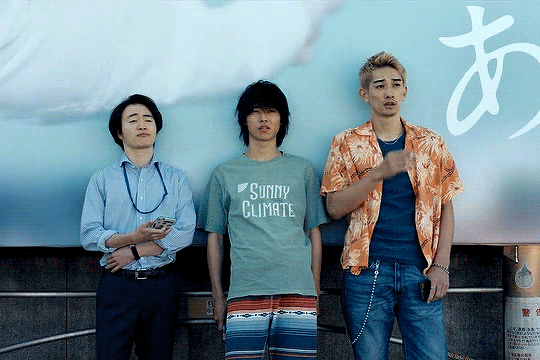
Short Summary
Alice in Borderland 今際の国のアリス is a Netflix original series about a young boy called Alice (Arisu) and his two friends who happens to find themselves trapped in an abandoned version of Tokyo in which they must take part in many life threatening games to survive.
I wanted to do a review on this series because I noticed that there were some characters that possessed very accurate and realistic behaviours and others that didn’t convey any emotion the entire show. I found it interesting that the mix of very different levels of well-displayed people was able to add to the already amazing plot of the series.
Characters Present:
Alice, Karube, Chota, Usagi, Kuina, Chishiya, Niragi
Alice - Protagonist
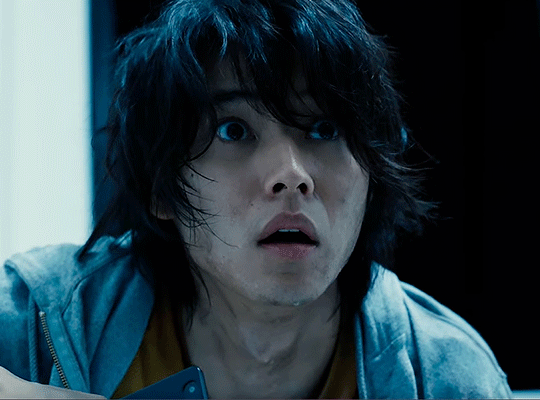
The main protagonist of the series is not always the favourite in most tv shows, but from looking at different reviews and people’s comments about Yamazaki’s character Alice, I’ve noticed that he is actually rather popular in his own fictional world. He is honestly probably one of my favourite characters as well, and that’s based on how realistic his behaviours and emotions are conveyed.
Some aspects and scenes of Alice that makes him a more convincing and realistic personality:
Being a normal young boy with no incredibly amazing skills
Not having god-like survival abilities just from being able to play battle-royal videogames well
Having flaws
Having only two close friends rather than a huge friendship group
Not being incredibly attractive and well-groomed
Not having a close relationship with his brother (not all siblings get along)
Having a bad relationship with his father
Having the very human instinct of survival by becoming willing to kill his friends to save his own life out of panic
Reacting badly to watching someone being killed (vomiting, screaming, trauma etc)
Not being incredibly serious all the time; actually having a sense of humour
Showing respect towards Usagi’s privacy
Having a very average style of clothing
Being awkward around people he doesn’t know
Excelling in one area (puzzles) but being quite disadvantaged at the rest
Making mistakes E.g. during the distance game, he doesn’t realize the trick of the game until it ends
Not being able to defend himself physically due to lack of strength
Not moving on after his friends’ deaths immediately like as if it doesn’t happen (it takes him a few days to even develop the energy to get up off the floor)
I would say I personally believe that Alice’s character has a strong and realistic personality, as Yamazaki’s acting and Alice’s reactions to certain experiences creates a sympathetic response from the audience.
____
Karube - Deuteragonist
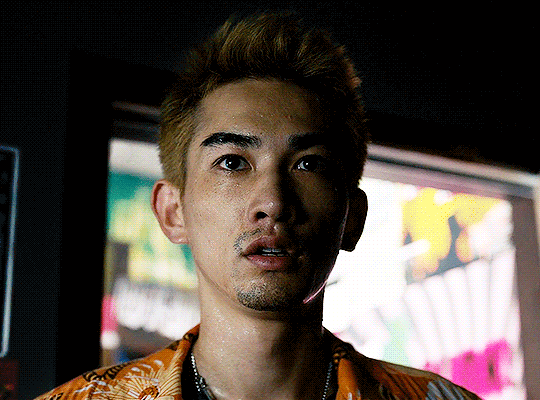
Let’s be honest, everyone loves a bad boy character. During the short time that Karube was present during the show, I think he conveys both strong and weak personality traits. At some points I think the producers were trying too hard to bring a “tough man” façade to him, when I think he could show more realistic emotions and reactions.
Some aspects and scenes of Karube that makes him a more convincing and realistic personality:
Having a fiery and defensive personality (although it can more than often come across as immature)
Having a sense of humour even in tough times
Having obvious advantage in strength related survival skills
Not being invincible to fear E.g. running from the tagger during the “Tag” game and not even trying to fight back at first
Dealing with work related issues
Actually having a realistic dream life rather than one that sounds almost impossible
Being flawed but not too flawed
Having a love interest that he is forbidden to love (she is with another man)
Conveying fear through anger when Alice tries to kill him to save himself
Not having the nicest of personalities (not everyone is friendly to everyone)
Not having a overly selfless personality
I think Karube should’ve been included in the series more than he is, because his character is very lovable and many fans of this show obviously show sympathy when he dies. His character has a big, extroverted and blunt personality, and I think it is conveyed very well during the time he is present.
____
Chota - Tertiary
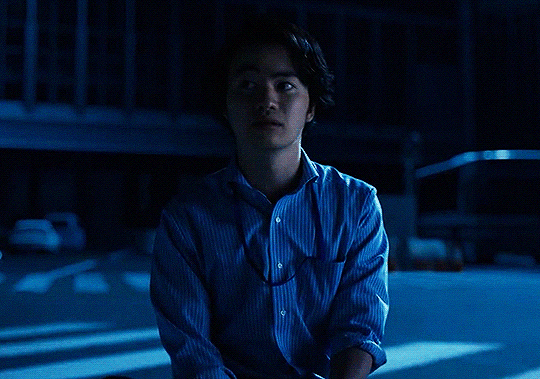
Although Chota is one of the main three characters in the beginning of the series, I honestly never felt that sympathetic for him. His character comes across as rather more annoying than weak to me. I understand that the point of his character is to have a weak and smaller personality to match Karube and Alice’s loud energy, but I think this person is kind of just there. He doesn’t do much, considering he almost loses his leg in the first episode and having to use crutches for the rest of the time he is alive.
Some aspects and scenes of Chota that makes him less realistic:
Being friends with people who obviously have dodgy jobs or no jobs at all when he is a successful technician himself
Doesn’t seem to have much of a life outside work and his friends, what are his hobbies?
Not exactly having much of a purpose in the show
Constantly having his guard up and being anxious or worried
Having too many flaws
Following a very different religion to that of his mother
Generally being incredibly different to Alice and Karube (I believe if their personalities were actually friends in real life, they would have too many arguments).
During the short time on the show that Chota had, it was more the point that his personality felt incredibly unneeded. It didn’t exactly serve a huge purpose in the storyline. As well as, he was hard to sympathize for.
____
Usagi - Love Interest / Deuteragonist
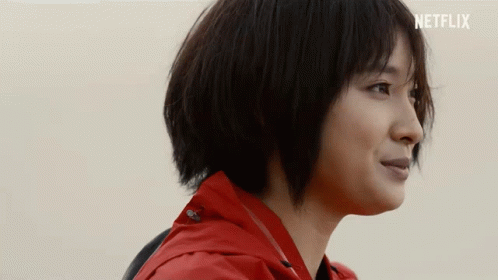
Usagi definitely has my most favourite back story of the series. Although, when researching about her I noticed that she is actually one of the characters that get the least recognition by the viewers, despite being in basically every episode and always being beside Alice. I have mixed emotions about the realism in her character, so I made both a positive and negative list to state both sides.
Some aspects and scenes of Usagi that makes her a more convincing and realistic personality:
Having a tragic yet realistic backstory
Using her mountain climbing skills as a huge advantage during physically challenging games
Showing obvious signs of grief for her father, even during the time she was placed in the game
Being insecure of her body
Fighting back against Niragi even when it’s obvious she won’t win
Having good survival instincts from past experiences
Willing to help others out when they need it E.g. during the “Tag” game she went along with Alice’s plan for everyone to work together
Having a obvious more introverted personality
Being too trusting, which ends up getting her hurt
Some aspects and scenes of Usagi that makes her a more unrealistic and poorly convincing personality:
Having too serious of a personality, not seeming to lay back and laugh for even a second
Seeming to have an unrealistic bravery E.g. during the tagger game, she didn’t seemed frightened at all despite that the tagger had a machine gun
Doesn’t react to graphic violent sights that would be traumatizing to humans
Not knowing what “The Beach” was despite being in the game for god knows how long
Overall, I think she is the awesome strong female character that a lot of thriller genres have. Although, I would love if for once a strong yet bad ass character didn’t act so mysterious and quiet all the time. But regardless, she is a good character that shows very human qualities.
____
Kuina - Confidante
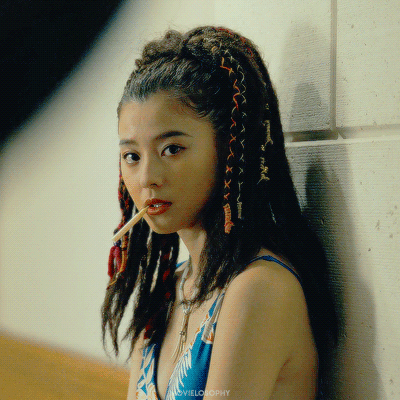
Kuina is one of the more popular characters in the show, which I honestly can understand. She has obvious very strong manipulation skills as well as physical strengths like martial arts. Although, I believe her backstory is what truly shapes her as a character and is the reason why the audience develops such an emotional connection with her.
Some aspects and scenes of Kuina that makes her a more convincing a realistic personality:
Having a trusting and good relationship with Chishiya
Having a personality that conveys carelessness
Both social butterfly and keeps to herself
Being a character part of the LGBTQ+ community
Having a realistic backstory
Although having a bad relationship with her Dad, she still respects what he taught her
Having a parent that accepts her rather than just being abandoned, which is what a lot of Transgender characters have been stereotyped as
Being able to defend herself incredibly well
Giving her a human flaw (smoking addiction)
Having a elaborate hairstyle
Showing that she is not mysterious, she just has a lot of walls up
Showing care for people she doesn’t know E.g. warning Alice and Usagi about the militants
I really like Kuina’s character for her strong personality and her ability to build good relationships with the members at the beach paradise. Although she is not featured a lot during season one, the times we have seen her have obviously been enough to make her character very loved by the audience.
____
Chishiya - Confidante
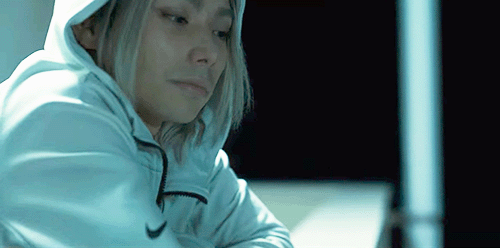
I honestly could not find a more loved character if I tried. This character is such a small part of the show and yet you’d think he was the protagonist. I honestly think anyone would love a sly fox character though, because that’s exactly what he is. Although his personality would probably become annoying if he was a real person, in a genre like this he fits perfectly. So personally, I have mixed emotions about him, because I honestly didn’t get that emotionally attached to him as other audiences may have.
Some aspects and scenes of Chishiya that makes him a more convincing and realistic personality:
Having a cocky attitude at times
Has a underdog appeal to him
Mimics that of a selfish manipulative personality
Showing obvious signs of high intelligence, yet doesn’t blab it around like it’s a trophy
Gives the audience some entertainment
Having a sassy remark, even when his life is on the line
Going out of his way to do things that only benefit him
Having a personality that everyone loves and hates at the same time
Having that personality in which you can’t tell if he’s a good guy or a bad guy
Having a trademark, his white hoodie
Having a caring relationship towards Kuina
Some aspects and scenes of Chishiya that makes him a more unrealistic and less convincing personality:
Attempting to kill Niragi with no hesitation after knowing him personally for so long (that would be difficult to do even if you hated the person)
Not showing human emotions such as fear, worry or anger
Sometimes his personality came across as too selfish to be realistic
Not showing any signs of fear E.g. when Niragi waved a machine gun in his face, he didn’t even flinch
Sometimes his fancy words became a bit annoying
Everyone trusts him, regardless of how manipulative they know he is
Overall, he is a very entertaining character. In my opinion he’s like the personality that throws a match into gasoline then walks away like he didn’t start it. Although his realism in character isn’t exactly good, he is definitely loved for his good looks and sly actions by the audience.
____
Niragi - Antagonist
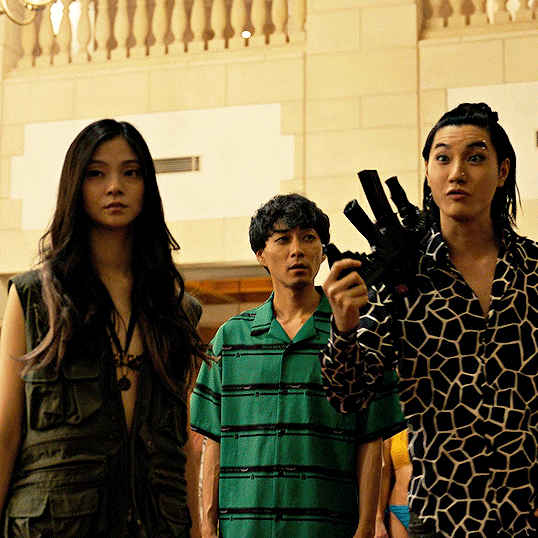
As much as I dislike this guy as a person in general, when it comes to creating a interesting and great character, he hit the nail on the head. He has one of the most realistic evil character developments probably in the whole series. His personality is so complicated and psychotic, which is what makes him an amazing antagonist and probably the second most popular character among the audience.
Some aspects and scenes of Niragi that makes him a more convincing and realistic personality:
Has a tragic backstory, making the audience believe that’s why he’s so psychotic
Having the delusional mindset that human nature is violence
Makes the audience feel bad for him, despite being a horrible person
Being a hidden antagonist (didn’t expect him to cause all the trouble in the end)
Showing obvious signs of psychological trauma
Conveys positive (yet destructive) emotions and behaviour, which is always a good break when all the characters are serious 24/7
Hits a breaking point in his emotions and goes on a killing spree
Shows loyalty to Aguni
Being awful to everyone, probably due to the fact that everyone was awful to him when he was younger. It’s a way of revenge
Becoming embarrassed when someone challenges him
Scaring people into submission (tactic for some leaders)
Conveys no care for anyone, honestly just uses everyone for either his own entertainment or his own benefit
Has a trademark, his machine gun and checkered shirt
Being self-aware of how evil he is
As evil and bad as he is, he’s one of the most endearing antagonists I’ve seen in a while. He is a very psychotic and emotionally wrecked personality to him, as if you know something traumatizing must have occurred in his life for him to be able to murder anyone without batting an eye.
#characterreview#character#aliceinborderland#alice#aib#writing#netflixoriginals#netflix#tvshows#characterreviews#usagi#karube#chota#kuina#chishiya#niragi
197 notes
·
View notes
Note
so…now that we all know what you DISLIKE about star wars (and 400% fairly so, you have my full support here)…
what drew you into the universe, what keeps you around?
favorite characters, ships (OTPs or actual spaceships lol), overall themes, do you have a favorite random weird creature or robot that you adore? whatever you wanna talk about!
go off honey (again, but supportively 💖💖💖)
tax paid: the very nerdy star wars punk vest i made and the even nerdier matching vest i made for starsky
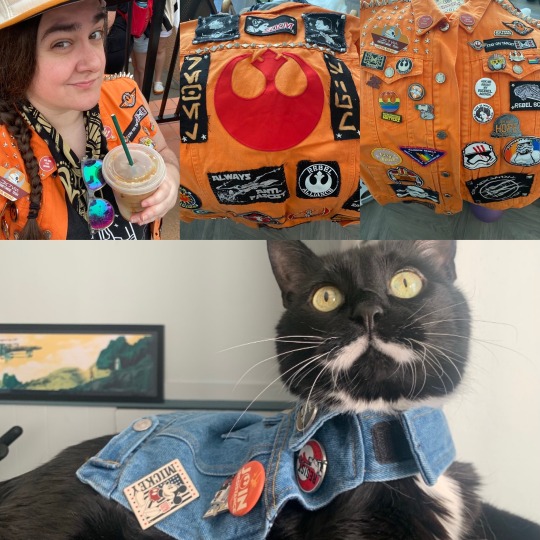
Lmaooo, entirely valid. You were like "star wars?" and I was like the drunk person at the bar who can't stop shouting about how much their ex sucks. But now that I have gotten all that off my chest, let's talk about why I love it (since if I didn't love it, I wouldn't have such strong opinions). Basically my feelings on the OG SW trilogy are similar to my feelings on the OG LOTR trilogy, as that tumblr post floating around somewhere put it: sure, they have flaws, but also, they're perfect. I have a complicated relationship with the prequels, as do we all, since George Lucas cannot write dialogue or direct actors to save his life (stick to what you're good at, George, hire other people to do the rest), but even they have their moments. Like. Hit me with that "Across the Stars" love theme, John Williams. Gahh. Just like that.
Because... Star Wars wasn't actually this omnipresent corporate global entertainment monolith when it started out. It was a dorky low-budget indie sci-fi film in the 1970s which everyone thought was going to bomb. But it told a simple and compelling story in an interesting way, everyone agrees that ESB is one of the best films/sequels ever made, and then ROTJ gave it a happy ending while it was still okay to do that. My main thematic gripe with the Disney trilogy (I will try to keep those to a minimum, lol, but I have to bring it up to compare) is that it very clearly fell into the "actual happy endings are naive and unrealistic and a cynical postmodern audience won't accept anything less than things being Bad" trap that, yet again, we have GOT to thank for. It obviously existed to some degree before that, but GOT blew it up to huge levels, where the only valid situation or character is that which is Grimdark and Depressing. Which, in my view, misses the heart and soul of what SW is all about??
Like. ESB is genuinely dark. ANH was this fun plucky little sci-fi film where the scrappy good guys won the day against the Nazi stand-ins, as they were supposed to, and then ESB comes along (speaking of John Williams, let us all chant together, DUH DUH DUH DUHDUHDUH DUHDUHDUH, DUH DUH DUH DUHHHH DUHHH DUHHH DUHHHH) and things go... wrong. Leia and Han are on the run for most of the movie, then get captured and tortured by the Empire and and betrayed (however unwillingly) by Lando. The Rebellion is attacked on Hoth (I tell you, those fuckin AT-AT walkers were SCARY when you see it as a young kid for the first time), and forced into hiding. Luke loses his hand, doubts Obi-Wan and Yoda and realizes that his mentors are fallible, makes dumb mistakes, and of course gets hit with The Most Famous Line In Movie History. But it's also just adrenaline and excitement. THE ASTEROID FIELD! THE HAN-LEIA BANTER! THE FIRST LUKE-VADER DUEL! THE FACT THAT YOU HEAR TWO FRICKING NOTES OF THE IMPERIAL MARCH AND YOU'RE JUST LIKE OH YEAH OH YEAH OH YEAHHHH!
But also then... Return of the Jedi. It gets shat upon for the Ewoks and reusing the Death Star as the Big Bad and being supposedly cheesy and not as Thematically Dark as ESB. Which is all kinda silly, in my opinion, but also, can we talk about Luke Skywalker's character arc and how he chooses possibly the most radical compassion ever demonstrated by a hero in an action movie, let alone a space opera. He insists that Anakin Skywalker is still in there somewhere and puts his own neck on the line to prove it. Luke doesn't save the galaxy by being a Badass Jedi. He saves it by throwing away his lightsaber and saying "I will not fight you, Father." He saves it by trusting that even in the depths of darkness, Anakin can come back from the charred ruins of Darth Vader and finally do what he was supposed to do all along. He can end Palpatine for good and all (we don't talk about "Somehow Palpatine has returned" because it's nonsense, obviously). Anakin can avenge the Jedi and what was done to him and all the lies he believed and the pain he wreaked on the galaxy, even then. It's not too late. It's not too late. Like. I don't care if this is Lightweight or Childish or whatever. It makes me CRY every time I watch it. Especially the moment where Luke takes off Anakin’s helmet and sees how ruined he actually is under there, and yet the downfall and death of the trilogy’s chief villain is not triumphant at all but instead utterly heartbreaking. “You were right about me Luke... tell your sister... you were right.”
Excuse me, I need to just /CRIES INTENSELY/
Luke won't be tempted to the dark side for his own sake, but Leia's ("If you will not join me, then perhaps she will"). I likewise hold firmly that Anakin/Vader is one of the best movie villains/antiheroes of all time and likewise have many feelings and Strong Opinions about his arc, prequel writing clumsiness and eye-rollingly tepid love story aside. (See: he and Obi-Wan were deeply in love and in a way they still are, don't @ me. I have no problems with Padme and obviously stan Natalie Portman at all times, but Anakin and Obi-Wan’s relationship is the real love story, the heart of the prequels, and in some ways even the subsequent movies, the end.) And “so this is how democracy dies, with thunderous applause” is... raw af as a line. For being in a Star Wars prequel movie. What?? (Also, the Revenge of the Sith novelization had no business being as good as it was. If only that dude had also written the movie.)
Anyway, my point is: the OG trilogy had plenty of moments of staggering emotional weight and where things genuinely sucked for the good guys and the outcome wasn’t entirely clear. The difference is that it didn’t choose to dwell on them, and it allowed for a transformative fictional space where a happy ending, fiercely fought for and squarely earned, was the right outcome. We didn’t need to go back thirty years later and make everything suck for fear that a cynical modern audience couldn’t connect with it otherwise. (Like I said, we didn’t need the new movies at all, but Disney heard that Cha-Ching of the Almighty Dollar). Star Wars was sci-fi, sure, but it also had the fantasy elements that allowed a happy ending to be the right choice for what we saw the characters go through and the philosophy that carried us through the original trilogy.
Likewise it’s just... Peak as far as dynamics go. C-3PO the fussy metal butler who worries about Everything and R2-D2 who is the droid embodiment of YOLO? Flawless. Sassy scruffy space pirate and badass politician warrior princess bicker constantly, butt heads, drive each other crazy, and then fall in love? Iconic. (And has shaped my ship tastes for... all of eternity, oops.) The above-discussed transformation of Luke Skywalker, whiny ordinary teenage kid, to the truly great man who fulfills what Obi-Wan, Yoda, AND the rest of the entire Jedi order couldn’t manage to do, because of their own flaws and blind spots and black-and-white moral views that didn’t know what to do with a man who loved as passionately as Anakin Skywalker, for better or for worse? The guy who managed to save the galaxy with love? STAN.
So... what? The Disney trilogy decides to retcon all that, throw everything that they’ve fought for out the window, make Han, Leia, and Luke miserable and rejecting the roles they grew into in the original trilogy, and die without ever really reuniting or seeing each other again as a trio? The underlying message was that “these happy endings aren’t satisfactory/realistic/sophisticated enough” and idk, maybe it’s just the shitshow of the last few years, but I’d like to see some entertainment that had the cojones to tell me that despite all the darkness and despair, maybe there’s a chance for hope. (”Rebellions are built on hope,” thank you Only Valid New Star Wars Movie Rogue One.) And Rogue One worked so well, despite being utterly GUTTING as all the heroes died one by one, because we knew what was coming next (A New Hope) and that their sacrifice was going to be worth it. I don’t care if that’s “realistic” or not. As I’ve said before, that’s what stories are for, and if I only wanted things that were Real Life, I would only read the news. Besides, the idea that happy endings never happen in reality is equally bullshit. We as a culture need to accept that more, instead of finding reasons to tear everything down.
So just... yes. The original trilogy might have flaws, but also, it’s perfect. And do I want to rewatch it all now? Kinda.
(Anyway. I warned you this was gonna be long. Oh look, it’s long, and I’m sure there is even more I could say, but still. Ahem.)
sleepover weekend asks
25 notes
·
View notes
Photo
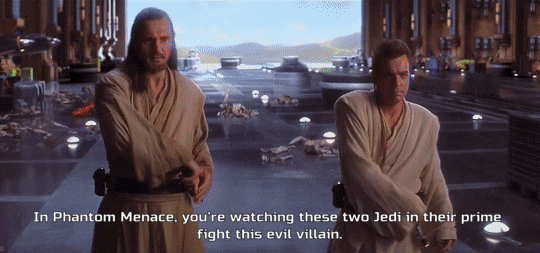
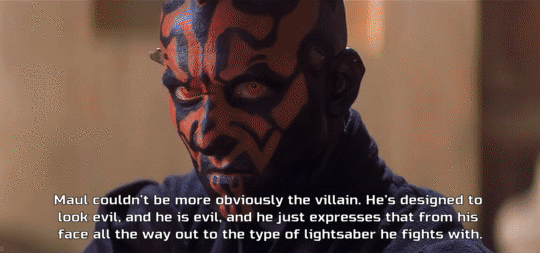


OKAY, IF I’M GONNA DO THIS, I’M GONNA DO IT PROPERLY. WHICH MEANS YEAH IT’S GONNA GET REALLY LONG. A couple of things to say ahead of time: Lucasfilm’s Story Group has always said CANON > WORD OF GOD when it comes to these matters, so when I quote canon examples from supplementary materials that contradict what he says, that’s LF’s official position, but that doesn’t mean that an influential person like Dave’s views couldn’t affect how things will be shaped in the future, like Deborah Chow listening to this may be influenced by it on the Obi-Wan show, despite that Master & Apprentice contradicts him. It’s an incredibly murky area! Mileages are going to vary. Another thing to keep in mind is that Dave Filoni never worked on The Phantom Menace, that was long, long before his time at Lucasfilm (which I think he joined sometime around 2007? and TPM was released in 1999), that he has worked with George more than probably anyone else, but we cannot and should not treat him as infallible or the True Authority on things, because even Dave himself has said things like: “I mean, I know why I did that and what it means, but I don't like to explain too much. I love for the viewers to watch stuff and come up with their own theories -- and they frankly come up with better things that I intended.” --Dave Filoni, Entertainment Tonight 2020 interview Or, in the same episode as the above Qui-Gon interpretation:
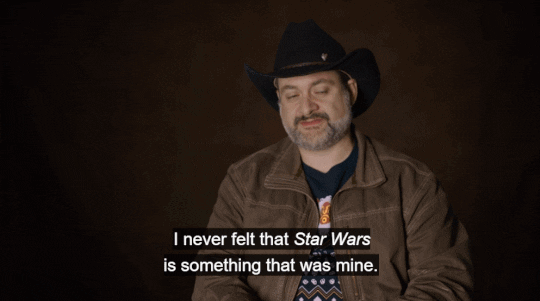


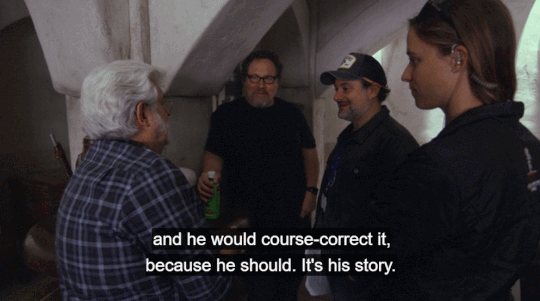
So, when I dig into this, I’m not doing this out of a sense of malice or even that I suddenly hate Dave or don’t appreciate all the incredible things he’s brought to SW, but in that I disagree with his take, Dave understands that he doesn’t always get it right, that he enjoys that fans come up with different things than he does and sometimes he likes those even more. There’s room for both of us and, for all that Dave mentions George a lot (and, hey, fair enough, the guy worked with George and I’m just quoting what George Lucas has said) doesn’t mean that this is straight from George, especially because I have never seen George Lucas utter so much as a peep about how the Jedi were responsible for Anakin’s fall. He has explicitly and frequently talked about how Anakin’s fall was his own choice, as well as I’ve never seen him say anything Jedi-critical beyond “they were kind of arrogant about themselves”. I have read and watched every George Lucas interview I could get my hands on and maybe I’m still missing something, but that’s literally the extent of him criticizing the Jedi I have EVER seen. (It’s from the commentary on AOTC where he put in the scene with Jocasta to show they were full of themselves, but I also think it’s fair to point out that Obi-Wan immediately contradicts this by going to Dex for help, showing that it’s not necessarily a Jedi-wide thing.) Before I go further, I want to say: this is not a post meant to tear down Qui-Gon, he is a character I actually really do love, but the focus is on showing why the above interpretation of him is wrong, which means focusing on Qui-Gon’s flaws. He has many wonderful qualities, he is someone who cared deeply and was a good person, I think things would have been better had he lived! But Anakin’s choices did not hinge on him, because Anakin’s choices were Anakin’s, that has always been the consistent theme of how George talks about him, the way he talks about the story is always in terms of “Anakin did this” or “Anakin chose that”, and the Jedi are very consistently shown as caring, they believed very much in love and Dave’s own show (well, I say “his own show”, but honestly TCW was George’s baby primarily and he had a lot of direct, hands-on say in crafting it, through at least the first five seasons) is plenty of evidence of that. I’m not going to quote the full thing because this is already a monster post, I’m just going to focus on the Jedi stuff, because I like the other points a lot, but if you want the full text, it’s here. The relevant part is: “In Phantom Menace, you’re watching these two Jedi in their prime fight this evil villain. Maul couldn’t be more obviously the villain. He’s designed to look evil, and he is evil, and he just expresses that from his face all the way out to the type of lightsaber he fights with. What’s at stake is really how Anakin is going to turn out. Because Qui-Gon is different than the rest of the Jedi and you get that in the movie; and Qui-Gon is fighting because he knows he’s the father that Anakin needs. Because Qui-Gon hasn’t given up on the fact that the Jedi are supposed to actually care and love and that’s not a bad thing. The rest of the Jedi are so detached and they become so political that they’ve really lost their way and Yoda starts to see that in the second film. But Qui-Gon is ahead of them all and that’s why he’s not part of the council. So he’s fighting for Anakin and that’s why it’s the ‘Duel of the Fates’ – it’s the fate of this child. And depending on how this fight goes, Anakin, his life is going to be dramatically different. “So Qui-Gon loses, of course. So the father figure, he knew what it meant to take this kid away from his mother when he had an attachment, and he’s left with Obi-Wan. Obi-Wan trains Anakin at first out of a promise he makes to Qui-Gon, not because he cares about him. When they get Anakin, they find him on Tatooine, he says “Why do I feel like we’ve found another useless lifeform?” He’s comparing Anakin to Jar Jar and he’s saying “this is a waste of our time, why are we doing this, why do you see importance in these creatures like Jar Jar Binks and this ten-year-old boy? This is useless.” “So, he’s a brother to Anakin eventually but he’s not a father figure. That’s a failing for Anakin. He doesn’t have the family that he needs. He loses his mother in the next film. He fails on this promise that he made, “mother, I’m going to come back and save you”. So he’s left completely vulnerable and Star Wars is ultimately about family. So that moment in that movie which a lot of people I think diminish, “oh there’s a cool lightsaber fight”, but it’s everything that the entire three films of the prequels hangs on, is that one particular fight. And Maul serves his purpose and at that point died before George made me bring him back, but he died.“ --Dave Filoni I’m going to take this a piece at a time to show why I really disagree with the content of both the movies and The Clone Wars supporting what Dave says and, instead, contradicts it a lot. The rest of the Jedi are so detached and they become so political that they’ve really lost their way and Yoda starts to see that in the second film. He doesn’t explain what this means, but I’m pretty sure that he’s referring to this conversation: OBI-WAN: “I am concerned for my Padawan. He is not ready to be given this assignment on his own yet.” YODA: “The Council is confident in its decision, Obi-Wan.” MACE WINDU: “The boy has exceptional skills.” OBI-WAN: “But he still has much to learn, Master. His abilities have made him... well.... arrogant.” YODA: “Yes, yes. A flaw more and more common among Jedi. Hmm... too sure of themselves they are. Even the older, more experienced ones.” MACE WINDU: “Remember, Obi-Wan, if the prophecy is true, your apprentice is the only one who can bring the Force back into balance.” OBI-WAN: "If he follows the right path.” None of that has anything to do with being “detached” and, further, I think this is something that’s come up with Dave’s view of Luminara a lot, because he’s described her (re: the Geonosis arc): “We were trying to illustrate the difference between the way Anakin is raising his Padawan, and how much he cares about her, and the way Luminara raises her Padawan. Not that Luminara is indifferent, but that Luminara is detached. It’s not that she doesn’t care, but she’s not attached to her emotionally.” Here, he says that the Jedi care, in the above, he says that the Jedi don’t care, which makes me think there’s a lot of characterization drift as time goes on, especially when fandom bombards everyone with the idea that the Jedi were cold, emotionless, and didn’t care. However, look at Luminara’s face in that arc, when she’s talking with Anakin:
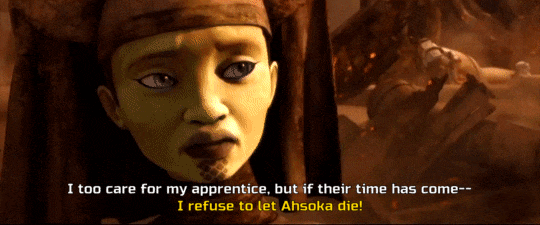
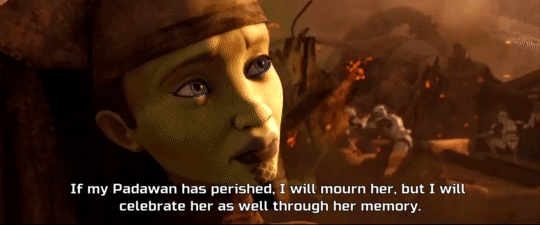
That is not the face of someone who doesn’t care. She even smiles brightly in relief when Barriss is shown to be okay, that this really doesn’t convey “detached” in an unloving or uncaring way. (We’ll get to attachment later, that’s definitely coming.) (I’m also mostly skipping the political thing, because I think that’s just a fundamental disagreement of whether Jedi should or should not lean into politics. My view basically boils down to that I think ALL OF US should be leaning more into politics because we are citizens who live in the world and are responsible for it, and the Jedi are no different. This is evidenced by: - M&A’s storyline has Qui-Gon and Obi-Wan saving the day specifically because they play politics, that’s how they manage to free the slaves, through playing politics and being part of the Republic/having Senate backing. - The Clone Wars has shown that the Jedi believe “lasting change can only come from within” and “it’s every citizen’s duty to hold their leaders accountable” when Ahsoka teaches the cadets on Mandalore, as well as that politics are not inherently bad, given that Padme and Bail are working to make the system better or “create lasting change from within [the system]” - "Trying to serve the greater good does not always make you popular” says Padme Amidala in a very caring speech - Star Wars Propaganda makes the case that the Jedi might have won the war had they leaned more into politics. - Sometimes the Jedi get unfairly accused of playing politics when there’s just no good choice and they still have to choose one or the other.) But Qui-Gon is ahead of them [re: caring and loving] all and that’s why he’s not part of the council. This is flat-out wrong in regards to canon. Mileages are going to vary, of course, on how much one takes a novel into consideration, but Dave Filoni is not a fan with the luxury of deciding what is or isn’t canon, he works on Star Wars where canon is canon. Now, does that mean canon will never contradict itself, especially if Dave gets to write something for Qui-Gon? Of course not, SW isn’t immune to continuity errors and they themselves have never said otherwise, even when fans want to hold them to that standard. However, this is still pretty much a big “that’s not what happened” instance. In Master & Apprentice, the Jedi Council offer a seat to Qui-Gon on the Council, specifically BECAUSE he has different opinions from them and they welcome that. (Excerpt here.) “We hope it will also be our gain,” Mace replied. “Qui-Gon Jinn, we hereby offer you a seat on the Jedi Council.” Had he misheard? No, he hadn’t. Qui-Gon slowly gazed around the circle, taking in the expressions of each Council member in turn. Some of them looked amused, others pleased. A few of them, Yoda included, appeared more rueful than not. But they were serious. “I admit—you’ve surprised me,” Qui-Gon finally said.“I imagine so,” Mace said drily. “A few years ago, we would’ve been astonished to learn we would ever consider this. But in the time since, we’ve all changed. We’ve grown. Which means the possibilities have changed as well.” Qui-Gon took a moment to collect himself. Without any warning, one of the turning points of his life had arrived. Everything he said and did in the next days would be of great consequence. “You’ve argued with my methods often as not, or perhaps you’d say I’ve argued with yours.” “Truth, this is,” Yoda said. Depa Billaba gave Yoda a look Qui-Gon couldn’t interpret. “It’s also true that the Jedi Council needs more perspectives.” Ultimately, Qui-Gon is the who turns them down and gives up a chance to shape the Jedi Council because he doesn’t like the shape they’re taking. That he does become less political, but this is after he’s argued that the Jedi should be working to push the Senate harder, so when he has a chance to help with that, he turns it down. It has nothing to do with caring and loving, it’s about Qui-Gon’s desire to not have to deal with the work himself, when he wants to be more of a hippie Jedi. (I’ve written a lot about Qui-Gon in M&A, why I actually think it’s really spot-on to someone who can be both really kind and really kind of a dick, but it’s not the most flattering portrayal, even if narrative intention likely didn’t mean what came across to me. I think this post and this post are probably the most salient ones, but if you want something of an index of the web that’s being woven with all the various media, this one is good, too.) So he’s fighting for Anakin and that’s why it’s the ‘Duel of the Fates’ – it’s the fate of this child. And depending on how this fight goes, Anakin, his life is going to be dramatically different. I have only ever seen George Lucas talk about Anakin’s fate in one instance and it’s this: “It’s fear of losing somebody he loves, which is the flipside of greed. Greed, in terms of the Emperor, it’s the greed for power, absolute power, over everything. With Anakin, really it’s the power to save the one he loves, but it’s basically going against the Fates and what is natural.“ –George Lucas, Revenge of the Sith commentary I’ve made my case about why I think Anakin’s fate is about that moment in Palpatine’s office, and so I’m not fundamentally opposed that “Duel of the Fates” is about Anakin’s fate, but here’s what George has provably said about the “Duel of the Fates” part of the story: - In the commentary for The Phantom Menace during “Duel of the Fates” and none of Dave’s speculation is even hinted at, there’s more focus on the technical side of things and the most George talks about is that it’s Obi-Wan who parallels Luke in going over the edge during the fight, except that instead of a Sith cutting off a Jedi’s hand, it’s a Jedi cutting a Sith in half, drawing the parallels between them. - He does say of the funeral scene that this is where Obi-Wan commits to training Anakin and how everything is going to go (though, in canon we see that Obi-Wan still struggles with this a bit, but Yoda is there to support him and nudge him into committing even more to Anakin, because the Jedi are a supportive community to each other). This is some solid evidence for that Obi-Wan is already caring about Anakin beyond just Qui-Gon. - Then here’s what he says about the “Duel of the Fates” fights and themes of them in "All Films Are Personal": George Lucas: “I wanted to come up with an apprentice for the Emperor who was striking and tough. We hadn’t seen a Sith Lord before, except for Vader, of course. I wanted to convey the idea that Jedi are all very powerful, but they’re also vulnerable — which is why I wanted to kill Qui-Gon. That is to say, “Hey, these guys aren’t Superman.” These guys are people who are vulnerable, just like every other person. “We needed to establish that, but at the same time, we wanted the ultimate sword fight, because they were all very good. It sort of predisposes the sword fight between Anakin and Obi-Wan later on. There’s real purpose to it. You have to establish the rules and then stick with them. The scene illustrates just how Jedi and Sith fight and use lightsabers.” “So Qui-Gon loses, of course. So the father figure, he knew what it meant to take this kid away from his mother when he had an attachment, and he’s left with Obi-Wan. Obi-Wan trains Anakin at first out of a promise he makes to Qui-Gon, not because he cares about him. We’ll get to the “attachment to his mother” thing in a bit--but, for now, let’s just say, George Lucas’ words on this are not that attachment to her was a good thing. Fair enough that “not because he cares about him” is up to personal interpretation, but canon has also addressed the topic of Obi-Wan’s treatment of Anakin and Obi-Wan stepped up to the plate on this. In addition to how we see Obi-Wan REPEATEDLY being there for Anakin and being concerned and caring about him, they specifically talk about Qui-Gon and overcome this hurdle.
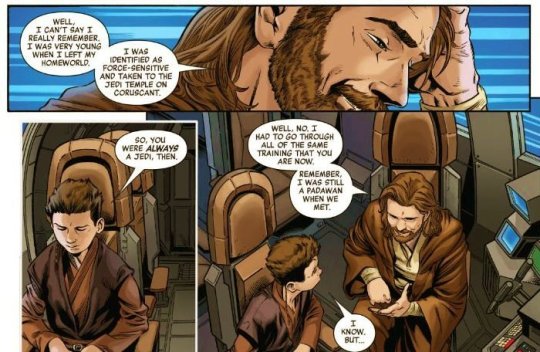
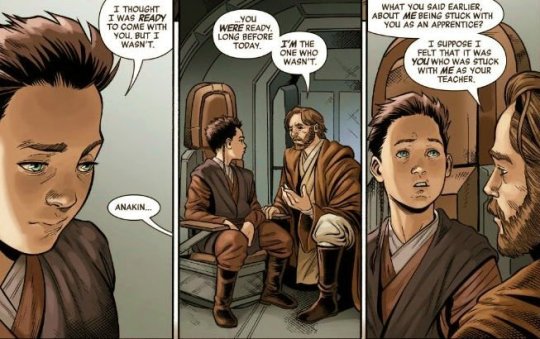
No, Obi-Wan is not Anakin’s father figure, on that we definitely agree. Anakin never really even treats Obi-Wan like a father--he says “you’re the closest thing I have to a father” in Attack of the Clones, as well as he says Obi-Wan practically raised him in The Clone Wars “Crystal Crisis” story reels, but Anakin has never actually acted like Obi-Wan is his father--”then why don’t you listen to me?” Obi-Wan points out in AOTC--as well as Obi-Wan glides past those remarks, which I’ve always taken that he doesn’t want to reject Anakin’s feelings, knowing that Anakin can be sensitive about them, but neither does he want to confirm them. This does not mean Obi-Wan was not supportive, caring, and loving. He says, “I loved you!” to Anakin in Revenge of the Sith, he asks after him and if he’s sleeping well in Attack of the Clones, and even George Lucas himself said that the elevator scene was set up TO SHOW OBI-WAN AND ANAKIN CARE FOR EACH OTHER:
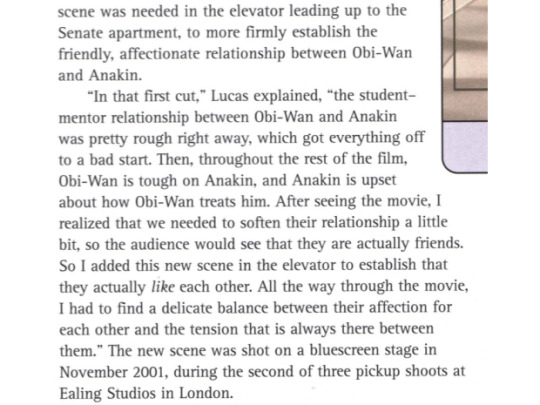
PUTTING THE REST UNDER A READ MORE FOR A BETTER LENGTH REBLOGGABLE VERSION, IF YOU WANT.
This is further evidenced by how the Jedi do see themselves as family, they just don’t need to put it into strict nuclear family dynamics: - “You were my brother, Anakin! I loved you!” [–Obi-Wan Kenobi, Revenge of the Sith] - “We are brothers, Master Dibs.” [–Mace Windu, Jedi of the Republic - Mace Windu] - “Did your parents bicker?” she asked. “The adoptive ones, I mean.” A slow smile broke across Ashla’s face, curling first one side of her mouth and then the other. Whatever she was remembering, Kaeden could tell it was good. "All the time,“ Ashla said, almost as if she were talking to herself. [–Kaeden Larte, Ahsoka Tano, Ahsoka] - Vos, brought to the Temple even younger than most, felt that he had hundreds of brothers and sisters, and it seemed that whenever he went into the dining hall he ran into at least half of them. [Dark Disciple] - “It was not his birthplace, exactly, but the Jedi Temple was where Quinlan Vos had grown up. He’d raced through its corridors, hidden behind its massive pillars, found peace in its meditation hall, ended-and started-fights in rooms intended for striking blows and some that weren’t, and sneaked naps in its library. All Jedi came here, at some point in their lives; for Quinlan, it always felt like coming home when he ran lightly up the stairs and entered the massive building as he did now.” [Dark Disciple] Brothers, sisters, and other more non-traditional kinds of family are not lesser and Obi-Wan and Anakin absolutely were family, just as the Jedi are all family to each other, so, no, there was no “failing” Anakin, except in Anakin’s mind, perhaps. (In that, I can agree. But not on a narratively approved level, canon too thoroughly refutes that for me.) Rebels as well pretty thoroughly shows that non-traditional families are meaningful and just as important--we may joke that Hera is “space mom”, but she’s not actually Ezra or Sabine’s mother, Kanan is not actually their father, and even if they sometimes stray into aspects of those roles (as the Jedi do as well in the movies and TCW), that they don’t need that traditional nuclear family structure. Mentor figures--and Kanan is Ezra’s mentor--are just as meaningful and needful as a “dad”. And I’m kind of :/ at the implication that anyone without a dad/father figure or mom/mother figure is being “failed”. When they get Anakin, they find him on Tatooine, he says “Why do I feel like we’ve found another useless lifeform?” He’s comparing Anakin to Jar Jar and he’s saying “this is a waste of our time, why are we doing this, why do you see importance in these creatures like Jar Jar Binks and this ten-year-old boy? This is useless.” Whether or not Obi-Wan is being genuinely dismissive in this movie (I think you could make a case either way), the idea that Qui-Gon is better than Obi-Wan about this, as shown through Jar Jar isn’t exactly very supported given how Qui-Gon and Jar Jar first exchange words:

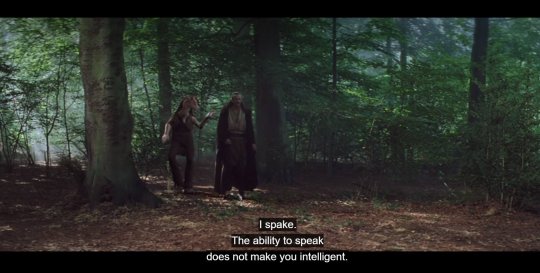
QUI-GON: “You almost got us killed. Are you brainless?” JAR JAR: “I spake.” QUI-GON: “The ability to speak does not make you intelligent.” Qui-Gon is just as bad as everyone else to Jar Jar, he’s not somehow elevated above them. It’s also baffling because, Dave, I have watched your show. The Jedi are specifically shown to be kind to people and creatures, not considering them “useless”. Henry Gilroy (who was the co-writer for The Clone Wars and frequently appeared in featurettes on the same level as Dave Filoni) explicitly draws this to The Jedi Way, that “life is everything to the Jedi“, when he said this about the Ryloth episodes:
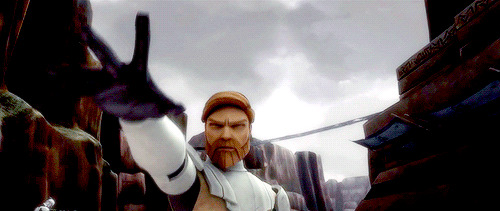
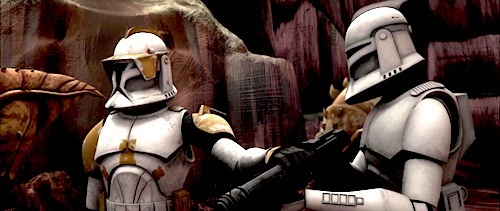
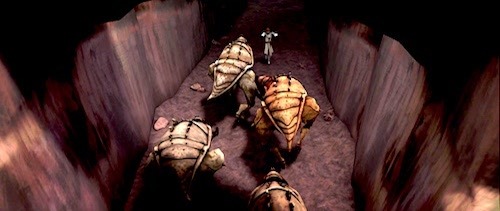
(Caps cribbed from Pan’s blog, because I cannot make another gif, save me, please.) Henry Gilroy in an Aggressive Negotiations Interview: "Obi-Wan truly is a Jedi in that he’s like, ‘Okay, I’m not going to murder these creatures [in the Ryloth arc of The Clone Wars]. They’re starving to death. They’ve basically been unleashed against these people as a weapon, but it’s not their fault. They’re just doing what they do. They’re just animals who wanna eat.’ "So the idea was–and I think there was an early talk about how, 'Oh, yeah, he’ll go running through them and slicing and dicing them and chop them all up or whatever, and save his guys. And I’m like, 'Yeah, but that’s not really the Jedi way. He’s not just gonna murder these creatures.’ "And I know the threat is [there], to save one life you have to take one, but the idea of him [is]: why can’t Obi-Wan just be more clever? He basically draws them in and then traps them. "It says something about who the Jedi are, they don’t just waste life arbitrarily. And someone could have gone, 'Oh, yeah, but it would have been badass if he’d just ran in there with his lightsaber spinning and stabbed them all in the head!’ And 'Yeah, you’re right, I guess he could be that, but he’s trying to teach his clones a lesson right then, about the sanctity of life.’ "That is the underlying theme of that entire episode. Which is: A tactical droid is using the people as living shields. Life means nothing to the Separatists. The droids. But life is everything to the Jedi. And even though he doesn’t have to say that, it’s all through the episode thematically.“ It’s also Obi-Wan who teaches Anakin about kindness to mindless creatures in the Obi-Wan & Anakin comic:

"These beasts are nearly mindless, Anakin. I can feel it. They are merely following their nature, they should not die simply because they crossed our path. Use the Force to send them on their way.” Now, fair enough if you want to say Obi-Wan was taught by Qui-Gon, but also Qui-Gon is dead by that point and Obi-Wan growing into being more mature is his own accomplishment, not Qui-Gon’s, especially given that we see Qui-Gon himself being pretty dismissive to Jar Jar in TPM. This isn’t unique thing either, Padme is incredibly condescending to Jar Jar in “Bombad Jedi” and expresses clear annoyance with him to C-3PO when sighing over him. Jar Jar is a character you kind of have to warm up to, pretty much the only one we’ve seen consistently being favorable to him is Yoda (and maybe Anakin, though, Anakin doesn’t really interact with him a ton) and Mace Windu warms up to him considerably in “The Disappeared” and even specifically is shown to be teaching him and helping him, which is a huge theme of the Jedi and how much they care.
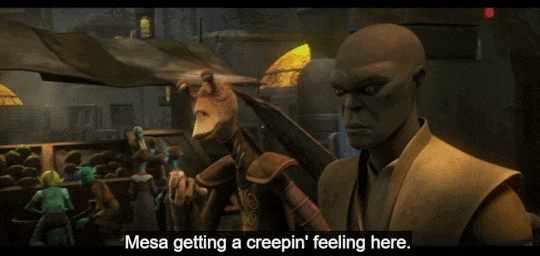
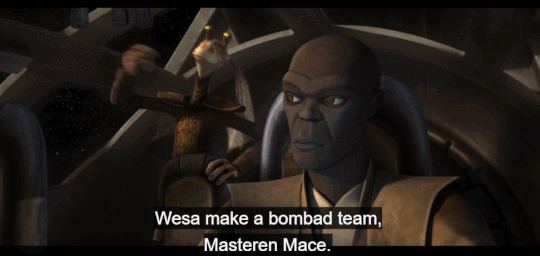
So, ultimately, the point I’m winding my way towards is--the other Jedi do show kindness and consideration to Jar Jar Binks, including characters like Mace Windu, so if you’re judging the Jedi based on that, the conclusion of Qui-Gon somehow being more compassionate and loving is really pretty thoroughly disproved by The Phantom Menace and The Clone Wars themselves. So, he’s a brother to Anakin eventually but he’s not a father figure. That’s a failing for Anakin. He doesn’t have the family that he needs. He loses his mother in the next film. He fails on this promise that he made, “mother, I’m going to come back and save you”. So he’s left completely vulnerable and Star Wars is ultimately about family. You could be charitable and say this is just from Anakin’s point of view that it’s a “failing”, but within the context of what Dave’s saying, it’s clearly meant as a more narratively approved take, not just Anakin’s point of view, and I really, really dislike the idea that Anakin--or anyone, really--needs a traditional nuclear family, ie a “mom” and/or a “dad”, or else it’s a “failing” for them. Setting aside that the idea that Qui-Gon would need to be Anakin’s dad to be kind to hi (which is ?????) is contradicted by The Clone Wars as well. Yes, Qui-Gon is warm with Anakin in several scenes, which is what Dave is presumably drawing on to show that Qui-Gon believed the Jedi should be caring and loving, but you know who else is warm to younglings? OTHER JEDI COUNCIL MEMBERS.
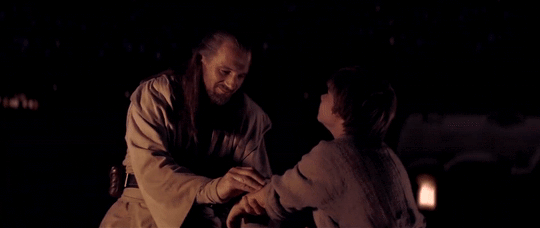
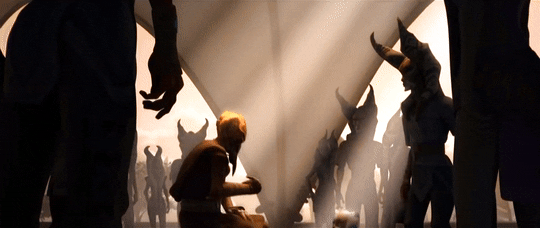
Those two scenes have the exact same kind of warmth to them. Ie, THE JEDI ALL BELIEVED IN BEING LOVING AND KIND, NOT JUST QUI-GON. The things evidenced to show Qui-Gon was loving and kind are evidenced just as much in other Council members, in Dave’s own show. As a bonus--have Mace Windu, known Jedi Council member, being super kind and loving towards a young Twi’lek girl he just met in a canon comic:
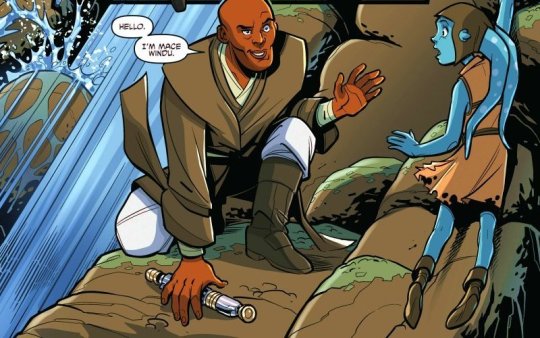
But I know that this is about the way the Council treated Anakin in The Phantom Menace testing scene, but here’s the thing--when I go back and I watch that scene and the Jedi aren’t ever mean to him, they’re neutral in an official testing situation, where they are trying to determine if he’s able to adapt to the Jedi ways. They never once say he’s bad for holding onto his fear, only that he does--which Anakin digs his heels in and gets angry about, he can’t really even admit that he’s afraid and that’s a huge deal for the Jedi. I’ve made a longer post about it here (and here), but the basic gist is: - That scene has Yoda giving the famous “Fear leads to the dark side” speech which is almost word for word how George Lucas describes how the Force works, showing the Jedi are narratively correct - “Confronting fear is the destiny of a Jedi” may be from the sequels, but it is thoroughly supported by the movies and TCW and Rebels and even supplementary canon material, including that the Jedi literally design their tests around both Masters and Padawans for it (Ilum, the Jedi Temple on Lothal, etc. - Anakin cannot admit to his fears in that TPM scene - We have examples of Jedi younglings do admit to their fears and the point isn’t not to have them, but to face them--the younglings in “The Gathering” are the most blatant example of this, but it’s also pretty much the entire theme of Jedi: Fallen Order, especially when Cal goes to Ilum to face his fears and get another kyber crystal. The point isn’t that Anakin--who has very good reasons to be afraid! nothing in the story or the Jedi have said he didn’t!--is wrong or bad, but that he’s not a great fit for the Jedi life because he is “unwilling to accept [Jedi philosophy] emotionally”. And they’re right about this, because this is how George Lucas describes Anakin in commentary: “The fact that everything must change and that things come and go through his life and that he can’t hold onto things, which is a basic Jedi philosophy that he isn’t willing to accept emotionally and the reason that is because he was raised by his mother rather than the Jedi. If he’d have been taken in his first year and started to study to be a Jedi, he wouldn’t have this particular connection as strong as it is and he’d have been trained to love people but not to become attached to them.” --George Lucas, Attack of the Clones commentary And so this brings us to A T T A C H M E N T, which, yeah, we’ve been having this discussion forever, but I’m going to state it again: Within Star Wars, ATTACHMENT IS NARRATIVELY A BAD THING. It is consistently tied to possessive, obsessive relationships, to greed and an unwillingness to let things go when it’s time (letting go is a huge theme in Star Wars) and equating love with attachment is fundamentally wrong according to George Lucas’ Star Wars worldbuilding: “The Jedi are trained to let go. They’re trained from birth,” he continues, “They’re not supposed to form attachments. They can love people-- in fact, they should love everybody. They should love their enemies; they should love the Sith. But they can’t form attachments. So what all these movies are about is: greed. Greed is a source of pain and suffering for everybody. And the ultimate state of greed is the desire to cheat death.” --George Lucas, The Making of Revenge of the Sith If attachment and love were the same thing, then he would be saying, “They should love their enemies, they should love the Sith. But they can’t love.” The way George makes the distinction shows that, no, attachment and love aren’t the same thing at all, attachment is not caring. Further, there’s another instance of him showing there’s an important distinction between relationships and attachment and the association of attachmets with possession: "Jedi Knights aren’t celibate - the thing that is forbidden is attachments - and possessive relationships.” --George Lucas, BBC News interview So, yes, when Anakin is attached to people, it is directly tied to obsession, possession, and greed, all things of the dark side: “He turns into Darth Vader because he gets attached to things. He can’t let go of his mother; he can’t let go of his girlfriend. He can’t let go of things. It makes you greedy. And when you’re greedy, you are on the path to the dark side, because you fear you’re going to lose things, that you’re not going to have the power you need.” --George Lucas, Time Magazine “But he has become attached to his mother and he will become attached to Padme and these things are, for a Jedi, who needs to have a clear mind and not be influenced by threats to their attachments, a dangerous situation. And it feeds into fear of losing things, which feeds into greed, wanting to keep things, wanting to keep his possessions and things that he should be letting go of. His fear of losing her turns to anger at losing her, which ultimately turns to revenge in wiping out the village. The scene with the Tusken Raiders is the first scene that ultimately takes him on the road to the dark side. I mean he’s been prepping for this, but that’s the one where he’s sort of doing something that is completely inappropriate.“ --George Lucas, Attack of the Clones commentary ATTACHMENT IS BAD IN STAR WARS AS THEY DEFINE IT. Finally, I’m going to circle back to: Because Qui-Gon is different than the rest of the Jedi and you get that in the movie; and Qui-Gon is fighting because he knows he’s the father that Anakin needs. Because Qui-Gon hasn’t given up on the fact that the Jedi are supposed to actually care and love and that’s not a bad thing. Here’s the thing about this: You know who else, by this logic, Qui-Gon should have been a father to? OBI-WAN KENOBI. This isn’t said as “Anakin specifically needs a father” (which I think would be an interesting idea to bandy about and I’m not disagreeing, though, it’s complicated because of what Anakin refuses to accept emotionally), it’s said in a bigger context, that Qui-Gon is better than the other Jedi because he understands the need for fathers (and thus this ties into Return of the Jedi) and he’s ahead of the other Jedi, who apparently think loving and caring about people are bad things, but Qui-Gon does not treat Obi-Wan like his son. Or, if he does, he’s not exactly a stellar dad about it. Within Master & Apprentice, there’s an incredibly consistent theme of how Qui-Gon thinks supportive things about Obi-Wan, but never says them aloud. He thinks he should talk to Obi-Wan about the upcoming decision to be on the Council and then never does. He could have explained why he kept Obi-Wan training the basics but he never does. There are multiple instances showing that Qui-Gon is actually really, really bad at actually handling a young apprentice who needs him to talk to them about important things. Qui-Gon continues this in From a Certain Point of View where he still never talked to Obi-Wan about everything that happened, even after he became a Force Ghost. Damn, damn, damn. Qui-Gon closed his eyes for one moment. It blocked nothing; the wave of shock that went through Obi-Wan was so great it could be felt through the Force. Qui-Gon hadn’t thought Kirames Kaj would mention the Jedi Council invitation. It seemed possible the soon-retiring chancellor of the Republic might not even have taken much note of information about a new Council member. --Master & Apprentice That comment finally pierced Qui-Gon’s damnable calm. There was an edge to his voice as he said, “I suspected you would be too upset to discuss this rationally. Apparently I was correct.” “I thought you said my reaction was understandable,” Obi-Wan shot back. “So why does it disqualify me from hearing the truth?” Qui-Gon put his hands on his broad belt, the way he did when he was beginning to withdraw into himself. “…we should discuss this at another time. Neither of us is his best self at the present.” --Master & Apprentice Obi-Wan walked toward the door, obviously outdone. “At the beginning of my apprenticeship, I couldn’t understand you,” he said. “Unfortunately, that’s just as true here at the end.” Only yesterday they had worked together as never before. How did Qui-Gon manage to get closer to Obi-Wan at the same time he was moving further away? Just before Obi-Wan would leave the room, Qui-Gon said, “Once, you asked me about the basic lightsaber cadences. Why I’d kept you there, instead of training you in more advanced forms of combat.” Obi-Wan turned reluctantly to face him again. “I suppose you thought I wasn’t ready for more. The same way I’m not ready to believe in all this mystical—” “That’s not why.” After a long pause, Obi-Wan calmed to the point where he would listen. “Then why, Qui-Gon?” “Because many Padawans—and full Jedi Knights, for that matter—forget that the most basic technique is the most important technique. The purest. The most likely to protect you in battle, and the foundation of all knowledge that is to come,” Qui-Gon said. “Most apprentices want to rush ahead to styles of fighting that are flashier or more esoteric. Most Masters let them, because we must all find our preferred form eventually. But I wanted you to be grounded in your technique. I wanted you to understand the basic cadences so well that they would become instinct, so that you would be almost untouchable. Above all, I wanted to give you the training you needed to accomplish anything you set your mind to later on.” Obi-Wan remained quiet for so long that Qui-Gon wondered if he were too angry to really hear any of what he’d said. But finally, his Padawan nodded. “Thank you, Qui-Gon. I appreciate that. But—” “But what?” “You could’ve said so,” Obi-Wan replied, and then he left. --Master & Apprentice "I owe you that. After all, I’m the one who failed you.“ "Failed me?” They have never spoken of this, not once in all Qui-Gon’s journeys into the mortal realm to commune with him. This is primarily because Qui-Gon thought his mistakes so wretched, so obvious, that Obi-Wan had wanted to spare him any discussion of it. Yet here, too, he has failed to do his Padawan justice. --From a Certain Point of View, “Master and Apprentice” (Further, in Master & Apprentice, Qui-Gon thinks that the Jedi give Rael Averross--who is HUGELY paralleled to Anakin--too many exceptions, were too soft on him because he came to the Jedi later than most and has trouble thinking of them as his family, and he thinks they should have been stricter with him.) It’s also readily apparent within The Phantom Menace itself:
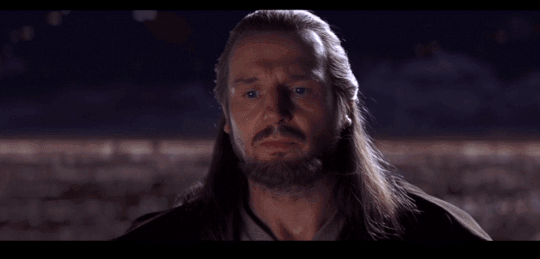
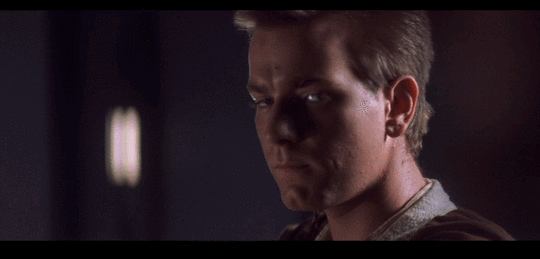
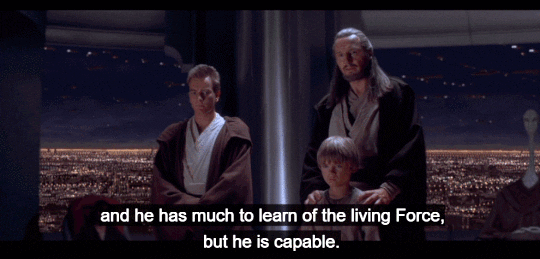

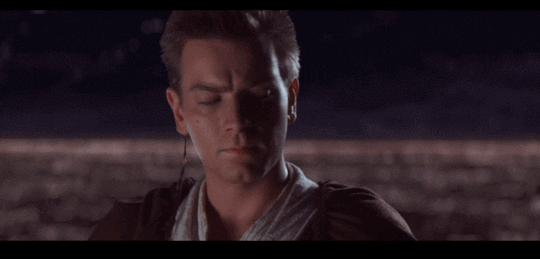
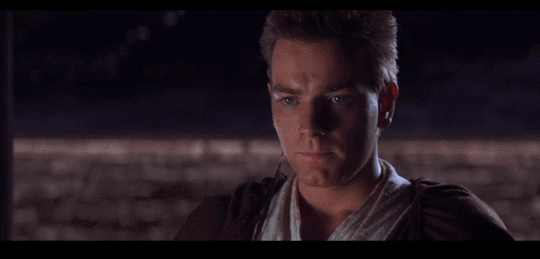
You can take some charitable views of this scene, that Qui-Gon was pushed into a corner where he had few other options (and this is the view I generally take even!), but this is after the entire movie where he’s never once indicated that Obi-Wan was ready, has instead indicated that he still has much to learn (not just of the Living Force, but in general), as well as made it clear that he’s still teaching Obi-Wan, like on the Trade Federation ship. And I do think Obi-Wan got over this because he understood, because Obi-Wan actually is a very selfless person, he clearly cares (which is furthered by how we see him warm up to Anakin very quickly), but look at their faces. This was not a good moment, and they do somewhat make up, where Qui-Gon says that Obi-Wan has been a good apprentice, that he’s wiser than Qui-Gon and he’ll be a great Jedi--but if we’re counting that as Qui-Gon being this great Jedi, then you can’t say Obi-Wan failed Anakin, given that we show him doing the exact same thing, except better. He tells Anakin, “You are strong and wise and will become a far greater Jedi than I could ever hope to be.”, echoing Qui-Gon’s words, but also he never threw Anakin aside for someone else. This is kind of a major undercurrent throughout The Clone Wars, where Obi-Wan never takes another apprentice, where he continues to teach Anakin, to support him, even to the point of occasionally co-Mastering Ahsoka with him. “This has been quite a journey for our Padawan.” Qui-Gon’s treatment of Obi-Wan in this scene isn’t the worst, he’s kind about it later (though, he never actually specifically apologizes for this), but we can see that this is a moment where Qui-Gon hurts Obi-Wan and knows it. And you know what George Lucas has to say about Qui-Gon? This: “So here we’re having Qui-Gon wanting to skip the early training and jump right to taking him on as his Padawan learner, which is controversial, and ultimately, the source of much of the problems that develop later on.” –George Lucas, The Phantom Menace commentary There’s nothing about Qui-Gon being right or better than the other Jedi, but instead that Qui-Gon’s actions here are a source of much of the problems that develop later on. So, ultimately, I liked some points Dave made in that speech, it’s a beautiful and eloquent one, but I thoroughly disagree with his interpretation of George’s intentions for Qui-Gon and I thoroughly disagree that that’s what the movies, The Clone Wars (DAVE’S OWN SHOW), and the supplementary canon show about Qui-Gon and the other Jedi. I still stand by my appreciation of Dave’s contributions to SW as a whole, I think he does a really good job at making Star Wars, but he doesn’t always get everything right and this is one thing where I think the canon and George’s commentary show otherwise, as much as I love his desire to defend the prequels’ importance in the story. Because, my friend, I have felt that every single day of my SW life.
991 notes
·
View notes
Note
Hello, I just found your blog and I like it very much, it’s very interesting to read!!!. My question is : what is your opinion on Ahmed and Kosem’s relationship? Do you think he truly loves her? What do you think about him seeing other women? And what do you think about his relationship with these women (Mahfiruz, Katerina, Gulbahar and Yasemin).
Thank you for liking my stuff!
I think that, just like Süleiman, Ahmet loves Kösem in his own way. It's not as toxic or problematic or often questionable writing-wise as Süleiman's love for Hürrem, but it still has both its ups and downs that make it interesting to explore.
Ahmet and Kösem is perhaps the love story where the writers made the most effort to mask the possible worse aspects of. It could even be considered actually romantic at points, with their amazing first scenes in the gardens and the amazing chemistry of Ekin Koç and Anastasia Tsilimpou, the beginning sense of wonder and "mystery" it started out with.... when she first met him, Anastasia didn't know he was the sultan and put all her trust in him - a certainly good first impression. Ahmet himself is also very far from Süleiman's direct endeavors and tests of loyalty, he tries his best to be respectful in his own way, despite that he fails to do that a bunch of times. That's why it's easy to miss the darker aspects of the relationship at first and it could be perceived as probably the only thing in the franchise that is remotely close to a "fairytale" of sorts.
However, when the curtains start to fall slowly, but surely, we come to realize that while, say, Hürrem learns to want what Süleiman wants, to be fully loyal to him and to cave to his demands just like he often caves to her own, Ahmet and Kösem as characters have entirely different values and needs throughout their whole relationship. The fact that Ahmet wanted Anastasia because of a picture, without him having ever met her, is incredibly telling: he has created an ideal of her in his own head from the start and he wants to consistently maintain it. When he's with her, it's as if he's living his own dream, his own perfect world that has place only for him and that young girl. (that's why the garden is so symbolic: Ahmet calls it a place of solitude, only for himself almost immediately after the audience is introduced to it; also that line from him: "The world is on one side, Kösem - on the other." - quoting by memory again, but the meaning is the same) Their world views gained from their past and present environments begin to clash from the moment she finds out he's a Sultan - she wants to desperately go back to her family, both because all of them are still alive and her free spirit that cannot bear to live in this golden cage. Ahmet doesn't let her go also because he lacks the understanding of this desire: he has grown in the strict Ottoman system and having people like Anastasia stay in the harem forever is something he finds perfectly natural; for him it's unthinkable to stand against it. But despite of that "minor offense", Ahmet's idea of Anastasia's "purity" and "perfection" was working for awhile, with her seeming to meet his expectations and slowly warm up to him. But the real truth is way stronger than your own made-up lies. Anastasia's pleas to let her go only get stronger until they reach their climax with her attempt to escape. And you know what? If it weren't for her contrived, yet convenient excuse to come back to him, he would've lost her. Helplessly, in a blink of an eye, he would've lost her, due to what she sees as sheer ignorance from his part. And when she gains her own bit of agency later in the season and becomes Kösem, when she develops and realizes the actual stakes of the game, beginning to play it herself due to survival by default and the will for revenge, Ahmet's "perfect picture" breaks apart and that apparently hurt him so much, he stayed mad at her for quite some time. This wasn't the person he knew and loved anymore, this was an entirely new, reborn woman. He didn't seem to love and respect her for the virtues she actually possessed, but for those that he had imagined her to always have in his head. That is another, more "subtle" level of toxicity than with Hürrem and Süleiman, but it's still toxicity, that's why this relationship is far from healthy and the "beautiful, but quirky" dynamic it sets the impression of.
Kösem's view of Ahmet is very interesting and complex, writing-wise. I actually don't think she grew to love him as much. The place she forcibly got in made her feel very limited by him mostly, since he was the reason she was here in the first place and he was calling the shots in terms of her future (whether she would visit her family or not?). What made her become a bit affectionate wasn't fully him himself, but rather the oh-so-prominent theme of adaption in the harem. She wanted to escape so desperately, but there were so many happenings and situations during the time she was in the harem that just demanded for her to get used to everything. So when Iskender gave her the chance to escape, she as become used to the harem's environment so much, she felt unsure of herself outside of it. Her return was out of necessity rather than love and even her standing up to the people when Ahmet was sick was done out of necessity, too (like I elaborated in another ask about Kösem). I'm not saying that she didn't feel any affection whatsoever, but the affection she felt for him was easy to let go of (E25: "Today I didn't marry only Sultan Ahmet, I married the country!"), because I don't think Ahmet did his best efforts to understand her and I don't think Kösem felt completely comfortable around him, all that contrasted with Kemankeş in S02, who according to her, understands her better than anyone ever could.
Ahmet loves Kösem, because even after his perfect picture with her was broken and his anger and denial and refusal to accept it passed, he did try to make things better. What I loved most about his dynamic with Kösem, is his open honesty with her that continued till the end. There have been scenes where they seemed like true companions, especially their beginning one in E21 with all the kids gathered around them. I loved that despite of his mistakes, he did try to set things right. There was this sudden protectiveness that activated in him when Kösem told him the truth about the death of his father and why she acted the way she did and that could mean she now became something of a "cinnamon roll he just protect" and that is certainly a flawed mindset to have in many aspects, but that showed he could actually care for her beyond his idealistic perspective of her.
Am I okay with Ahmet having other women? Honestly, I'm glad that MCK lowered the concubine arcs to a minimum and with the way they did it, it doesn't offend me as much. I would even love some of them to be more developed for a change, because they did turn out to be solely drama tools, thanks to their lesser episodes and MCK's different themes as a whole, that basically did their purpose and left, instead of stretch out and outstay their welcome and that is just the other extreme in a bad disguise.
I won't talk about the relationship he had with his other women as much, because they just aren't fleshed out. I would've liked to see more of Ahmet and Mahfiruze: I believe he was way more decent with her than say, Süleiman was with Mahidevran, and their scenes weren't half bad. Too bad that would've demanded Mahfiruze herself to be fleshed out more as a character and the writers to give her more of a place in the narrative. Katerina was present only for an episode (or was it two episodes?) and we don't have as much conclusions to drive here. We only have his mild infatuation with her and... that's it? We have no idea what Katerina actually felt or how their dynamic would play out in the long run. We can only speculate. Gülbahar, by contrast, also had the least screentime of all his women who have comparatively minimal screentime, but her exploration in S02 helps us gain a better idea of how it went between them. I have the impression that she was the least favourite concubine of Ahmet's, ever. She did succeed to get pregnant and have a child, but it probably was a one and done thing and she didn't seem to get any other grasp of manly affection since then. Which is why, along with them taking away Bayezid from her by exiling her, she was so focused on scheming for one particular goal and this became what defined her. But then again, that is still a speculation in my part. Now, with Yasemin we have much more on-screen chemistry and interaction: that relationship felt very similar with what Süleiman thought of Firuze - infatuation, massive infatuation, but still not love, because just like Firuze, Yasemin also gave him poison and we don't know how much the poison affected his psyche, along with the sickness it brought upon him. These relationships have the opposite problem MC's concubine arcs had: these women were all unfavored or favored very temporarily in the span of an episode or two, which made them very stale and lacking in material.
Lastly, while MCK in its entirety, isn't very big on love stories, Kösem and Ahmet's relationship still had an evolution throughout S01, even if that evolution was more "condensed" than the others similar to it. It still remains the most fleshed out love story in the show, along with Kösem and Kemankeş's, and it was a very important part of the story that helped shape much of the narrative that succeeds it.
#magnificent century#magnificent century kosem#magnificent century kösem#magnificent century: kösem#sultan ahmed#kosem sultan#kösem sultan#ask#elenahoward
38 notes
·
View notes
Text
(some) Riordanverse characters (bc I never read TKC) and which Hogwarts House I think they would be in
Warning: this is a long one
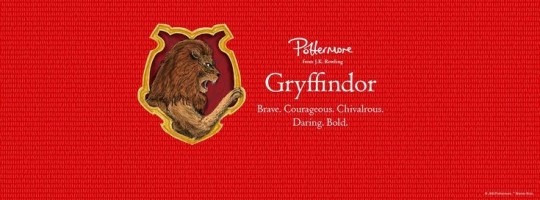
Nico: the dude is definitely Gryffindor without a doubt. Like Sorting isn't about some traits and some characteristics, it's about core personality. He may have gone through some of the roughest stuff when he was 10-12, and he was resentful and bitter, but he was brave and bold af throughout everything he did. From learning about his powers, to using them relentlessly despite knowing how exhausted he is afterwards, to his willingness to do whatever is necessary to do what has to be done, because it has to be done. You can't change my mind that he's Gryffindor lol.
Grover: Do I even need to explain why he's Gryffindor? He's a satyr, and even if we're shown strong satyrs, they're not really supposed to be brave fighters. Yet he is one of the strongest, bravest nature spirits we've ever encountered in the Riordanverse, and one of the bravest in general. Like he's so passionate about doing what is good, he's a hero, and the only thing he doesn't match with common Gryffindors is that he's humble and as far from arrogant as could be possible, but it doesn't take his courage away.
Hazel: She's Gryffindor, and core personality-wise, she and Nico are very much alike. They don't ever think about themselves, like Hazel really always does what has to be done, no matter the cost, I mean she literally died preventing Gaea to rise the first time, and she freed Thanatos while believing he would take her back to the Underworld. She's brave af, and she has one of the most strong willpower we've seen in the Riordanverse. She's a passionate hero, and she's the closest thing to a real knight in shining armor.
Lester: I'm gonna place him in Gryffindor because I don't think he fits in in the other houses lmao. That said, as Apollo he's very shitty, but as Lester, he's one of the most courageous people. He's grown so much, he's so willing to actually do stuff now, and sacrifice everything to do what's right, including his life, even if he doesn't know he's gonna survive. Hell, he really went most of TTT with an incredibly painful wound that nearly turned him undead, and he cared more for the future of Camp Jupiter than his own life. Additionally, he's a bit arrogant and cocky, but he truly means well, I love Lester so much.
Clarisse: Look look, all I have to say is that no one could have pulled off less than half the stuff Clarisse has done, she's so Gryffindor it hurts. She's reckless and impulsive, but she's driven by her passion to do good, even if she's the daughter of war, and was bullied by her own father. She's daring, she's bold and she is the hero. She's also arrogant and thinks she can solve everything by herself, something characteristic more of the canon Gryffindors in the books, rather than what the fans have shaped. In fact, she's very much like Gryffindors in the books, who are actually very rude to other houses and think they're the best. Still, at heart, she's in this house.
Alex: I'm in a huge dilemma about where to put them, but I reckon they'd fit pretty fine in Gryffindor. Not only are they daring and courageous, they're proud of who they are, but not in a too full of themselves kind of way, rather in a 'I am who I am, and if you can't accept me, fuck off' kind of way. They can get carried away rather easily though, and very arrogant, thinking they don't need anyone else, when they do in fact need some company. They are one of the kindest and at the same time most ambitious characters we've met, but they are brave beyond understanding in a very personal way, thus, Gryffindor.
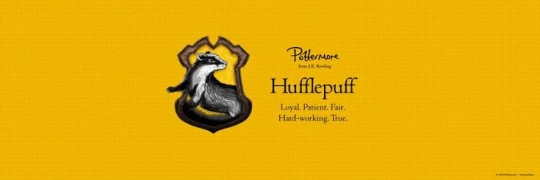
Percy: I think it's fair to say he'd be Hufflepuff, because loyalty is literally his fucking fatal flaw, and he is the kindest sweetheart to all those who deserve it, he goes out of his way to help those who need help, whether that be mortals, halfbloods, gods, magical creatures or even his own enemies. He's too good for this world, and even if he's grown a bit bitter, he always looks to fight justly for what is right, and never loses faith in others. That, and the fact that he turned down immortality so that the olympians were more inclusive of minor gods, and their children were treated better. He's just a lovely soul, he's like 80% Hufflepuff so that's enough for me. All that and he's stubborn as hell.
Jason: Hufflepuff. Just, undoubtedly Hufflepuff. Like he seems to be this cold and self centered hero with a superiority complex (bc of all the son of Jupiter stuff) but he's the softest guy there is. Not only is he hardworking, open minded and kind, he appreciates justice but he doesn't seek for revenge or anything, he makes sure people are treated fairly and wants everyone to be accepted. Proof of that is how he continued Percy's job of including more gods, and made sure Nico felt comfortable with who he was. He truly has a heart of gold. (He deserved better btw)
Meg: God I can't decide between Hufflepuff and Gryffindor, but I think I'll go with the former. She's so strong, my baby, she's faced so much wrong, but she's still so kind and understanding of others, especially those who deserve kindness. She puts up such a hard facade, but she's so patient and warm and inclusive. She's brave and strong (as strong as the big three kids, if not stronger), but she's also so loyal to her beliefs despite how she was forced someone else's beliefs for years, so I'll keep her in Hufflepuff. Also, she's stubborn af, and she can be lazy, so that settles it.
Will: I KNOW some people will say Will could be in other houses that are not Hufflepuff, BUT I won't have it any other way. Will is literally the warmest person ever. He is kind and sympathetic and enthusiastic and patient and inclusive. Like Helga Hufflepuff would take one look at him and lose her shit screaming "mine". He's the guy who saw the son of Hades so many people were scared of and immediately grabbed his hand and transfered him some warmth and didn't let him go ahead and get himself killed. He's also the one who everyone loves and likes, so much that Clarisse gets along with him and he can calm her down. He's the ideal Hufflepuff, you can't change my mind.
Magnus: I mean, what else can you expect from the son of the god of summer? He's literally a guy who heals others with warmth. He's also the guy who spent years on the street with the most difficult situations, and accepts every single person the way they are. He's inclusive af, and tolerant of everything. He's the guy who's closest include a deaf elf, a Muslim valkyrie, and a black dwarf, and he's dating a genderfluid person. Yes he's brave, and he's kinda smart, and he's ambitious, BUT none of those qualities overpower his Hufflepuff nature.
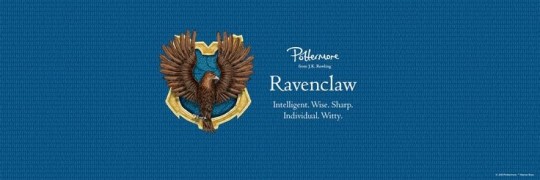
Piper: Kinda debated whether Gryffindor or Ravenclaw fits more, but in the end I went with Ravenclaw. Even though she isn't a fighter, she's very very brave, yet her bravery isn't compared to her wits. Like others in the PJOverse, she wins her fights by outsmarting her opponents, but unlike others that's one of her strongest traits. She's witty and creative and a little on the negative side, she really struggled to work in a group rather than by herself. On another note, she's able to keep calm in crazy situations and come up with the craziest most unthinkable solutions (I'm talking borderline ridiculous) that always somehow work. She's not booksmart, but she knows so much about everything, and she's lifesmart you know?
Reyna: Why are some of these so hard? Deeply debating whether she'd be Ravenclaw or Slytherin. In the end I'd go more for Ravenclaw though. Reyna's smart as hell, she's strong and sharp, and she always sees the best way out of a situation. She's witty and observant, being able to keep her cool in battle and lead others in the best direction. She's always looking to grow, and she prefers to do things on her own, but she's a great leader. She has some Slytherin qualities, and she's not learning as learning oriented as others, but she's definitely Ravenclaw.
Sam: Let's face it, Sam has the only active neurons in all of MCGA, she's definitely Ravenclaw. I'm gonna be honest though, I've only read MCGA once, so I can't remember much of their personalities, but Sam is witty and clever, pretty much the only one who can come up with competent plans, while the others rely mostly on luck and whatever plan they can cook up in 5 seconds. She's loyal and true to who she is, and she's extremely courageous and proud of who she is, but her sharpness is what she stands out for me, which is why I put her in Ravenclaw.
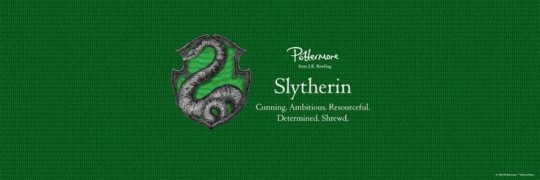
Annabeth: I know the obvious option is Ravenclaw, but I genuinely think she's also Slytherin. Yes she is booksmart and wise like Ravenclaw, but her personality matches Slytherins' ambitious, cunning and resourceful nature. She's smart as fuck, but she's calculative, she always finds a way to end up winning, and while she does so by outsmarting her opponents, she wouldn't need to outsmart them if she weren't so competitive. I feel like there's this 40/60 odds on Slytherin rather than Ravenclaw, but it's that small difference that counts. Plus her leadership skills are so powerful that people don't ask, they just know she's the boss.
(Also just picture the sweet and loyal Hufflepuff boy with the strong and cunning Slytherin girl, like it should be as opposite as it is with Poseidon and Athena, but they're so cute)
Leo: Idk what you can expect that's not Slytherin. This boy is the embodiment of ambition and determination. Reminder that not all Slytherins are bad btw (I'm slytherin myself), but like he's life smart and cunning, and he can analyze situations faster than anyone else. He's charismatic and talented, and there's no one to stop him from triumphing. I don't have much to say, I just know he'd be in Slytherin.
Rachel: She's kinda a difficult one, and I struggle between Gryffindor and Slytherin, and tbh I'm still not sure. But I think I'd place her in Slytherin, because even if she's brave af (especially since she was a mortal fighting in a war out of her power), her main trait is her determination. When she's set on something, she gets it done. You can't tell her she can't do something, because she will find a way to do it. She's kind, and she's only a mortal, but she still has incredible power unlike any other. I don't think I can really name it, but I think she'd be put on Slytherin with much difficulty from the Sorting Hat.
Luke: Where else could Luke possibly go? On the meaner side Slytherins have created themselves, Luke would be part of those misled by who preceded them, by those who want to take advantage of their mistreatment (bc let's face it, Slytherins are mistreated by both students and Hogwarts staff), and turn them cold and bitter. Luke is ambitious and manipulative, being manipulated himself, and it comes easily because of his natural charisma and talent. He's very freaking determined and cunning too. He'd fit right into Slytherin, but he'd be viewed as one of the rotten lot.
Thalia: I don't have much to say about this, but Thalia is the girl whose fatal flaw is their desire for power (or smth along those lines), just like most Slytherins. She's ambitious, she's smart, she's truly talented, she stands out between the rest, and she knows it, and she actually kinda likes it.
(Also I put Annabeth, Thalia and Luke in the same house because they're all kinda similar, even if their beliefs and postures are different.
Frank: Ngl I'm having more difficulty with Frank than anyone else. I'm kinda torn between Gryffindor, Hufflepuff and Ravenclaw. I literally can't choose. He'd fit perfectly in any of them lmao, I just can't decide where he'd go. You decide this one yourself.
Please keep in mind, this is my personal opinion and my take on the characters, and not all of you will agree, and that's fine! You can let me know what you think (kindly please, don't come at me), and if you want to, send me an ask on a character you want me to do the same as these (as long as it's not TKC, I'M SORRY I haven't read those) go ahead, don't be shy!
#pjo#hoo#toa#mcga#riordanverse#percy jackson and the olympians#heroes of olympus#percy jackson#annabeth chase#grover underwood#nico di angelo#clarisse la rue#luke castellan#will solace#jason grace#piper mclean#leo valdez#frank zhang#hazel levesque#magnus chase#alex fierro#samirah al abbas#hogwarts houses#gryffindor#hufflepuff#ravenclaw#slytherin#rachel elizabeth dare#lester papadopoulos#meg mccaffrey
214 notes
·
View notes
Text
Jace Beleren, Masculinity, and the Trans Experience
(This post is a Twitter thread I wrote in response to a Goblin Lore podcast episode called “Jace Beleren and Toxic Masculinity”.)
I feel I have a unique perspective on this topic as a trans man. Trans man Jace isn't my headcanon, but it's an interpretation I love. He's my favorite character of all time, and as a trans man, I feel like reading Jace's flaws as toxic masculinity isn't quite right.
There are several "pillars" of toxic masculinity that Jace doesn't have. He doesn't have the self-destructive emotional repression, worship of sex and violence, or desire to subjugate women and his peers that men who experience toxic masculinity have.
Even BEFORE Ixalan, Jace was an example of many positive masculine traits. He was curious and emotionally open. He wrongly believed he could make decisions for others, but he cared for people, wanted to protect them, and couldn't sit idly by when he knew people were in danger.
In Agents of Artifice, he financially provided for Kallist and Liliana, and in Magic Story invited the Gatewatch to live in his home. Jace wanted to heal Garruk, tried to stop his rampage and had a Hedron implanted in Garruk's shoulder to relieve the effects of the curse.
"I don't want to hurt you, Garruk."
"Lucky for me, I don't feel the same way."
"Garruk, this is not a fair fight. You've suffered enough. Please. Come with me."
[...]
Jace stood in thought. Garruk held him by the throat, could end his life in an eye blink, had already proven he was immune to Jace's illusions. Garruk laughed again. If Garruk was open to having friends, then Jace might have been a good one.
"You win," said Jace. "We will leave you alone. I will not seek you out. But please, if you change your mind, come find us on Ravnica. Something is still not right here. We can help you."
In "Revelation at the Eye" Jace tells Ugin that Zendikar isn't a puzzle to be solved, and that it didn't matter if killing the Eldrazi has consequences, there are real people on Zendikar fighting for their lives and he needs to help them.
"Zendikar isn't a puzzle to be solved," said Jace. "It's a place. It's somebody's home. And those people are out there, right now, fighting for their world and wondering if anybody's going to help them kill what's killing them."
He showed scenes of suffering, then—of families mourning the lost, of landscapes ravaged by Ulamog, of even the skies and seas teeming with the Eldrazi menace.
Ugin cocked his head. The hedron architecture of the chamber seemed to melt and flow, became a pattern of tessellating dragons mocking him from the walls.
"So certain," said Ugin, "and so young."
Ral Zarek tried to kill Jace and ruined his relationship with his close friend Emmara, but in "Project Lightning Bug", Jace forgives him. Jace is honest about his feelings with Ral even after Ral was openly rude to him.
"I don't remember home," Beleren said quietly, unbidden.
"What?"
"You talked about growing up in Ravnica. A lot of my memories from my childhood are gone. Chopped up in my head into a few impressions. Most of what I remember begins here, on Ravnica. I'll never have roots here the way you do, and I admit I'm off to other planes a lot. But I think of myself as Ravnican to the core, too."
In Kaladesh block he wanted Chandra to be able to confide in him, and didn't want to stay home when he heard she could be in trouble. He used his mind magic to help Nissa sleep when she had a sensory overload in the busy city.
Nissa looked up. Jace and Gideon were exchanging a look. Both glanced at her.
They stood as one.
Jace turned toward the coat room. "I'll head to Kaladesh. It should be easy for me to—"
Lavinia appeared in his path, one hand resting on the pommel her sword. "Again?" she said, in a weary, disappointed tone.
He frowned up at her. "You can't expect me to sit here and do paperwork!"
Across the streets, beyond the barricades, the Consulate's panharmonicons are still blaring "The Gremlin's Wedding March" at us on infinite repeat at double speed. They left them on all night, and after the moon set Nissa started crying, hands clamped over her ears.
[...]
Jace sat down with her. They talked a minute and his eyes flashed. She curled up in a big potted plant and didn't wake up until the sun fell on her.
But what does being a man mean to Jace Beleren? Well, take a look at his feelings towards Gideon. Jace saw Gideon as the male ideal. I think Jace admires (and is envious of) the way Gideon is a representation of positive masculinity.
Eyes widened, jaws set. They understood their task, he was certain of that. But were they actually prepared to perform it?
What would Gideon say?
Jace smiled. Of course.
"For Zendikar," he said, raising one fist in the air. It felt thin to him, lacking Gideon's armored fist, his baritone war cry, his iron conviction.
None of that mattered. The soldiers shouted as one voice, holding their weapons aloft.
"For Zendikar!"
Gideon is not violent or hypersexual. He's kind, not afraid to ask for help, a defender rather than an aggressor. The pillars of toxic masculinity are absent in both Jace and Gideon. So why does Gideon's mere presence make Jace insecure? I think that insecurity is dysphoria.
I'm only 5 feet tall. People treat me like a kid, think I need help, and certainly don't see me as a man because I'm very small. It feels bad knowing my looks don't inspire others or make them feel safe like big tall guys can.
Gideon is super tall, muscular, conventionally attractive. He's charismatic and a natural leader. Gideon's like a human lighthouse. Jace is average height, out-of-shape, often pale and sickly, and his telepathy makes people automatically distrust him.
It's easy to see why people follow Gideon's lead so easily rather than Jace's. As a trans man, I personally related to Jace's insecurity. He feels inadequate compared to Gideon.
"I'd rather stand," said Gideon.
Jace stood up. It was an error. He still had to crane his neck to look Gideon in the eye, and now the size difference between them was glaringly obvious. He hated feeling small. Hated it.
Jace wanting to lead the Gatewatch didn't come from a desire to dominate others and be an ~alpha male~, but from a desire for people to believe in him. What Jace really wants is to prove to himself and others that he's competent and that he can be trusted.
This vision appeared whenever the man was struggling at a task.
[...]
"Listen, you aren't really suited to this task. Let me handle it." The vision's voice was gruff but friendly.
It came off as condescending.
The man was annoyed.
"I can do it myself."
The hallucination sighed. "You and I both know you're not suited to this. Let me handle it, you go philosophize on the other end of the beach."
"I said I can do it myself." The man let his irritation reach his voice.
"No, you can't. I call the shots and execute, you stand to the side. That's how this works."
The man responded by throwing his hook at the hallucination. It went straight through the figure's eye and landed behind him on the sand.
The time he spends with Vraska is so good for him! I loved that [the podcasts hosts] talked about how he was finally happy to follow someone else's lead! He didn't need to be a leader, he needed someone to trust him. She respected and loved him and thought he was incredible for who he is.
Vraska looked him in the eye. "You're incredible. You know that, right?"
Jace returned her smile and felt his cheeks warming. "I do my best."
"Well, your best is incredible," Vraska said, turning toward the central tower and approaching a large gate on what appeared to be its back side.
Liliana never told Jace he was incredible.
Liliana would have scoffed. She would have made a dismissive joke, rolled her eyes, and called him a show-off. She would not bother to talk to him for days. She would consume the body of a demon with a crocodile's jaws and laugh over the sound of its flesh tearing off. She would do all sorts of things, but she would never call him incredible.
It was important for Jace to get that validation. Now he's not insecure about his appearance. It's not that he finally developed into someone who was caring. He was caring all along, but he was held back by insecurity about how others perceive him. He learned to love himself.
Despite all his good qualities and deeds he still felt insecure because it wasn't easy to visually see him as a "strong man". I think it's important to acknowledge positive masculinity even when the man in question isn't attractive or charismatic, and even if he makes mistakes.
As a trans person, Jace's experience reminded me of the struggle to "pass". It's frightening how easily insecurity can turn into toxic masculinity when you feel different from "real men". If you don't look the part, some people will just never acknowledge you.
Next to 'perfect' guys like Gideon, it's easy to see our own perceived weaknesses and shortcomings. Easy to feel resentment for it. But from this struggle comes the strive to be better men, to be confident in ourselves, and comfortable in our bodies.
There's SO much I wanted to talk about, like how Jace's trauma shaped his need for control, how the IRL gamer guys he was created to represent actually hate him, how he's a male victim of abuse by a female partner, etc but this thread is already terribly long.
TLDR; I think toxic masculinity as a reading of Jace is missing some perspective. The trans perspective. Not all insecurity men experience is toxic masculinity. Sorry I totally should have waited until part 2 was out, but I couldn't stop thinking about that episode.
There's a lack of trans men's voices in... basically everything, and this is something I think we should definitely be included in. I'm so grateful for the Vorthos community opening these kinds of discussions. Super excited for part 2 of the podcast!
306 notes
·
View notes